#finrod is dark now
Text
okay, all is fine, but still:
Sauron/Finrod THE WAY Findo is way darker after the song of power duel. Sauron found a way to change his fea and it made Ingoldo not a beast, but a powerful wizard, who is Sauron's alliance now. and maybe- you know what i mean- not only alliance, but his dark husband, because Sauron LOVES that dark power of him and those new cruelty and despicableness of him :)
please kill me already what am I thinking about;)))))
#sauron#finrod#silmarillion#silmarillion fandom#tolkien#j r r tolkien#sauron x finrod#au#finrod is dark now#I AM WRITING TAGS AND GETTING ONE CRAZY IDEA AFTER ONE ABOUT HOW THAT ALTERNATIVE UNIVERSE CAN LIVE MY GOD#I imagined Three Dark Ring-bearers#elven dark#tyelperinquar#annnnd maeglin i guess#celebrimbor#maeglin#silmarillion headcanons
17 notes
·
View notes
Text
Just how willing members of the House of Finwë are to 1v1 Dark Lords (or 2v1 - 5v1? - but then Gil-Galad achieved his purpose so I'll cut him some slack here) would make me concerned about their general sanity if I wasn't already aware the collective amount is only not at zero because Finarfin is an outlier adn should not have been counted
#all the braincells in this family belong to Findis and Finarfin who got them from their mother#Finrod got passed down one (1) of them which means he's no less crazy but in slightly less destructive ways#and he still duels dark lords because of course#... Orodreth seems generally the most normal non-extraordinary person among them all which means he gets killed#on the Nolofinwean side they skip two generations to end up with (1) Idril (2) Gil-Galad (3) Elrond#and Celebrimbor is hogging the single Fëanorian one#but I'm not saying any of them are sane#...and now I've overexplained the joke but never mind#my post#Tolkien#Silmarillion#silm#house of Finwë#finarfin
24 notes
·
View notes
Text
There is a sad lack of Orodreth/Celebrimbor. Really letting down the Gil-Galad's dads extended universe.
#no but while I do think the text points to both of them being adults at the time of the Finrod incident#I am compelled by the idea of them as very young adults just vibing#in a moderately toxic family environment until suddenly uncle cousins are being exiled and fed to wolves#and the situation just escalates so quickly. now they're furiously exiling the remaining adults#making out at the office throne room and forge#seizing control of the city#holding hands in the dark#playing house#refusing all calls to arms#crossing your fingers uncle thingol doesn't ask too many questions about who you're dating#watching your boyfriend set his uncles' letters on fire unopened#just dirtbag teen things
11 notes
·
View notes
Text
does the Oath of Feanor work as a magical compulsion, or does it have magical properties, and are its consequences real?
yes, because the magic of Arda is also based on words of power, and it would be dissatisfying and limiting to assume that somehow that power doesn't work in this specific instance. no, because even if Feanor is the one speaking, not even his power could bend the fate of elves to that extent. yes, because the fate of any one people can be bent, delayed, or weirdly modified until an oath is fulfilled; in LOTR, the ghosts of the path of the dead prove it. no, because Manwe and Varda would not feel bound to enforce an oath of death with them as witnesses, and it goes against the rules of oathing. yes, because the enforcer is Eru, they just stand as witnesses and do not have the power to release the swearers as Eru would. no, because we don't even know if Eru accepted that oath. yes, because if the oath was invalid from the start, it would be beyond callous of Manwe and Varda not to inform the swearers and allow the consequences of the oath to happen. no, because a magical compulsion would remove or to an extent at least lessen responsibility of actions taken in its pursuit. yes, because the author of the story acknowledges a certain "will" of the oath by making it wake or sleep with active verbs. no, because even swearing without additional magic on top can feel like a compulsion to do things or to keep going that otherwise would not exist or not be felt by a given swearer. yes, because no matter what the everlasting darkness is or does, it can be real independently from any other prior compulsion to act; in other words, there may not be a magical property to the oath, but its called consequences for the swearers are very real. no, because there's several slightly different versions of the oath across the texts, and it's impossible to do a literal, word for word reading of its lines if it's possible to recite it slightly differently at a given time. yes, because the only valid version is the original pronounced by Feanor in Tirion, you can't wiggle out of that one. no, because who's to say that was recorded correctly, it's far too poetic for a sudden decision. yes, because who's to say that Feanor couldn't whip out all that via improvisation, I bet he could. yes, because other characters beyond the sons of Feanor treat the oath as something absolutely serious and real, and that includes Finrod in speaking to Andreth, when he says that Eru's name is not called upon even in jest, as well as Melian, when pointing out the strong forces awakened by involving that power. no, because neither of them can talk to Eru anyway. yes, because it's narratively more satisfying to imagine characters morally struggle against something that is eventually unbreakable and unavoidable like in any good tragedy. no, because it's narratively more satisfying to imagine characters do it to themselves and compromise with who they are out of family loyalty. yes, because the curse of Mandos actively turns it against the swearers into a betraying force, a consequence that wouldn't otherwise be a given, that is, nothing says that everything they start well would have finished badly and that the oath would have led them to defeat, and if it weren't magical before Mandos' addition, it is now. no, because Amrod's death in a draft would prove it breakable through his (admittedly only guessed) desire to turn back. yes, because he still died in the process, aka the everlasting darkness claimed him for being an oathbreaker. no, because how is it possible that it's simultaneously unbreakable and broken. yes, because the fate of arda and that of elves is inscribed within the eternal paradox of everything being predicted and everything being free will, and that will never be solved, neither regarding the fate of the elves nor the oath of Feanor. no, because the oath is a narrative device. yes, because the oath is a narrative device. three hundred more lines.
hope this helps. hope it doesn't. your pick.
400 notes
·
View notes
Text

Where now all our sons? for Tolkien Reverse Summer Bang 2024 ( @tolkienrsb ) in collaboration with @niennawept. Title roughly translated from this song by Lind Erebros.
Eärwen, mother of Finrod, Angrod, Aegnor, and Galadriel, as I imagined she might have been had she joined the Host of the West in Beleriand during the War of Wrath.
Other thoughts below.
This was strongly influenced by Jenny Dolfen's A Sorrowful Meeting in theme, if not in execution. I've always wondered how much those in Valinor knew about the goings-on in Beleriand, where so many other reunions would never happen.
Women, broadly, get the short shrift in the canon narrative, so I wanted to draw focus to them and their grief, not as helpless, hopeless, hand-wringing maidens, but as angry, maybe even ambivalent avengers of what they had lost.
This closing verse from Edna St. Vincent Millay's "Dirge Without Music" was very much on my mind:
Down, down, down into the darkness of the grave
Gently they go, the beautiful, the tender, the kind;
Quietly they go, the intelligent, the witty, the brave.
I know. But I do not approve. And I am not resigned.
169 notes
·
View notes
Text
Hair Headcanons for the rest of the Finweans:
Celebrimbor: Dark, raven-wing colored iridescent hair. Exactly like Feanor. Just like the rest of Celebrimbor. I'm sure he doesn't have any feelings about that.
Idril: Blonde hair with darker streaks near the roots. 10/10 for shimmer, looks like actual gold. Even Glorfindel is vaguely jealous. She particularly enjoys how sapphires look in it and often wears it in locs, like her father.
Maeglin: Dark hair, like Aredhel's; often seems to have streaks of a dark purple color. He usually wears his hair loose, which would be a safety hazard in the forge if not for the Finwean Hair Magic™️. He does very little in the way of hair care, but his hair still always looks perfect because of course it does.
Earendil: Originally had blonde hair similar to Idril's, but that's changed since he became a living star. Now, his hair looks almost like golden fire, flickering strangely even without wind, tapering off to white near the end, though his glowing hair has nothing on the radiance in his eyes, which is said to burn the unworthy– just like the Silmaril he wears as a crown.
Celebrian: Her hair is actually very similar to her mother's– the "silver" in her name refers to how it looks under the moon, but under the sun, it has a distinctly more golden hue. Is often seen with fireflies floating around her hair like a crown. (This may or may not be Elrond's doing)
Gil-Galad: No one can agree on what Gil's hair looks like. Some say it's as silver as mithril, flowing long and straight down his back. Others insist his hair was just like Fingon's– though maybe a bit darker. Other say he had Finrod's golden curls, or even Maedhros's red tresses. What they can all agree on is that Gil clearly had Finwean Hair Magic™️, and was therefore clearly a Finwean... even if they weren't sure exactly where he came from.
Elrond: Exists at the fascinating intersection of Finwean Hair Magic™️ and Melian's Maiarin magic. Normally, his hair actually looks a lot like Finwe's; dark with many colors of sparkly iridescence. But sometimes, on nights when the moon is full, or when thunder rumbles in the valley, it seems to have a mind of its own; more living shadow than hair. Many people have asked about this. Elrond has not provided anything resembling a proper explanation.
#silmarillion#silm headcanons#house of finwe#celebrimbor#idril#maeglin#earendil#celebrian#gil galad#elrond#elrond peredhel#eldritch peredhel#more hair headcanons!
183 notes
·
View notes
Text
Looking at Sauron in the tale of Beren and Lùthien, and I gotta admit there's something about him that's almost a bit...goofy in a way that he's just not in other stories. Specifically the strong "cheesy 80's cartoon villain" vibes I get from him. I mean just look at him:
His precursor was a giant talking feline called Tevildo, Prince of Cats, via the Book of Lost Tales.
His original name Thù basically means 'stinker'.
He lives in a dark creepy tower on an island he took over as lord of werewolves and vampires, is a shapeshifter and even transforms into a werewolf and vampire at one point in the story.
He's described multiple times in the Leithian as a wizard, and Tol-in-Guarhoth as the "Wizard's Isle". He's straight up the classic evil sorcerer type.
In the Leithian he has an 'evil laughter moment' in nearly every scene he's in. First when he tricks Gorlim, second when he's interrogating Finrod, Beren and Co, and third when he overhears Finrod reveal his and Beren's names by accident while imprisoned.
He's Morgoth's number one fanboy, so desperate for his master's attention to the point that even Morgoth finds it annoying("Tidings enough from Sauron came/but short while since. What would he now?" LOL).
He wears a dark cloak and hood even indoors("wrapped in his cloak and sable hood/in his high tower...").
After being defeated by Lùthien and Huan he flees to the dark, creepy forest of Taur-nu-fuin and proceeds to make it even darker and creepier, never mentioned in the silmarillion again up until long after the War of Wrath.
And last but certainly not least, he mocks Gorlim's love for his wife, and then later proceeds to get absolutely wrecked by the power of True Love.
This guy is such a comically evil dork on a whole other level its hilarious.
374 notes
·
View notes
Text
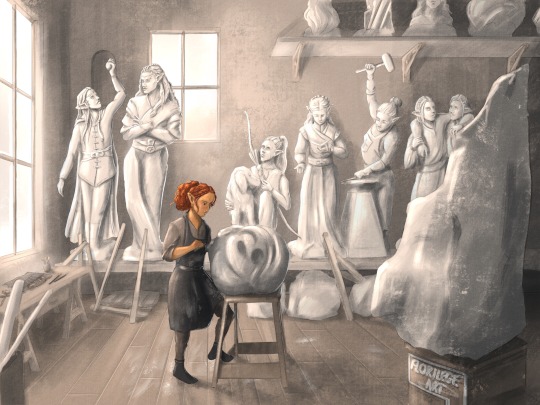
The Sculptor in her Workshop, Unknown, Late Third Age, Tirion.
and

The Return of the Lost Son, Unknown, Early Fourth Age, Tirion.
This is something of a companion piece to this Nerdanel character study (on AO3). In it, she sculpts her husband and sons as she feels them die across the sea, and she waits long ages for Maglor until he comes home.
(Makalaurë, standing still in the empty space that long awaited him, makes a better marble than live body.)
I think this is the most detailed piece I've ever done. I genuinely started it as "oh, I have a very vivid mind picture of this scene, I could do a little sketch!" and here I am about two weeks and 19 hours of painting later. I'm really proud of it, though.
Please reblog if you like it!
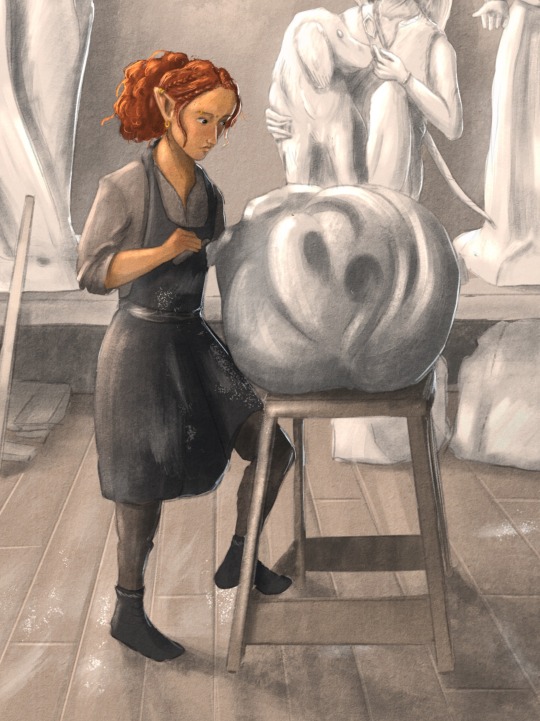
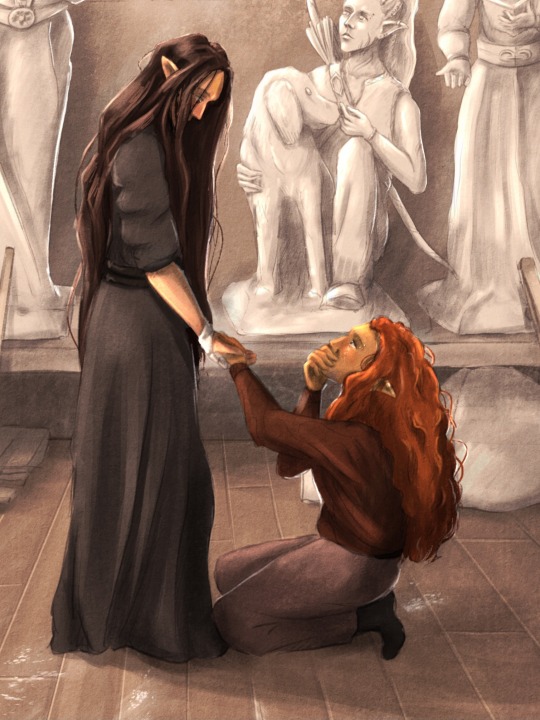
IDs (also in alt), details and more rambling under the cut.
[ID: Two digital paintings of the same room, a sculptor's workshop. In the first, Nerdanel, a light-skinned elf woman with long curly red hair, is working on an abstract sculpture in marble. Behind her are six marble life-sized statues: Fëanor, brandishing a gem, Maedhros, with one hand missing, arms partly crossed, and after a gap, Celegorm, kneeling down to hold Huan, Caranthir, reading a book, Curufin, forging a dagger on an anvil, his arm raised to hammer it, and Ambarussa, holding each other. On the foreground right is a large stab of marble waiting to be sculpted.
The second painting has the same background with the workshop and statues, with a more reddish tint as if it's sunset. The abstract sculpture has now replaced the slab of stone and in the middle, Nerdanel is kneeling in front of Maglor, as light-skinned elf with very long dark hair, holding his hand, while she has her other hand on her mouth. She is crying. Maglor is standing in the gap between the statues of Maedhros and Celegorm.
The other pictures are details of the first two.]
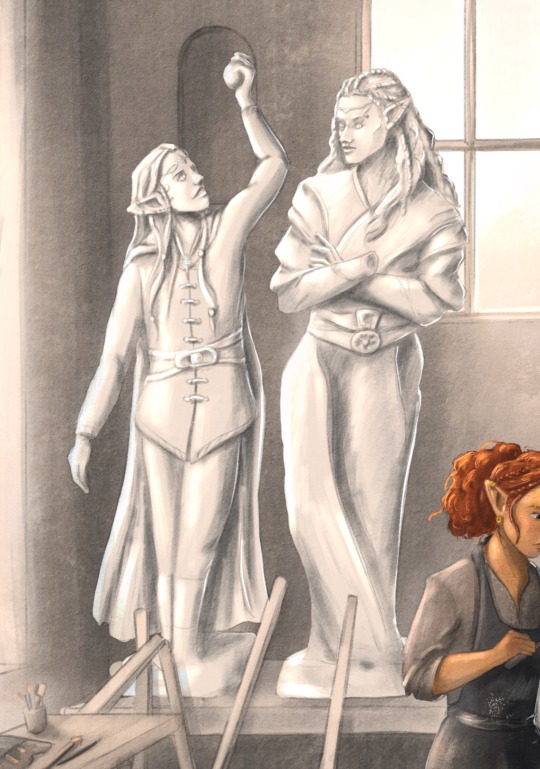
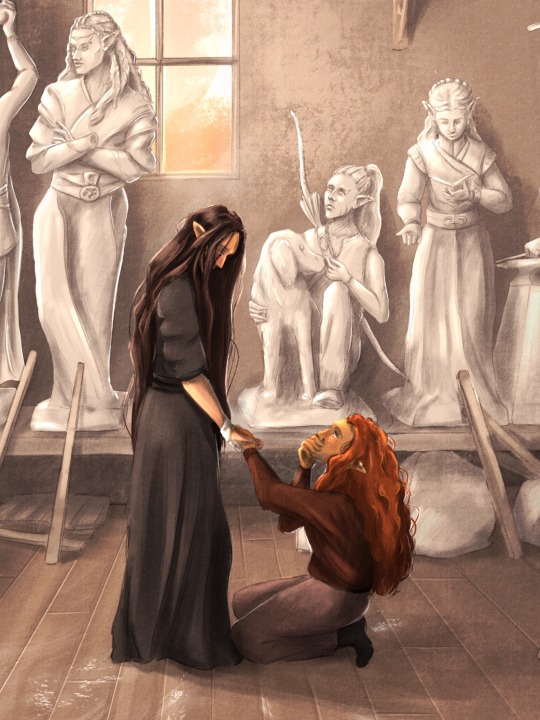
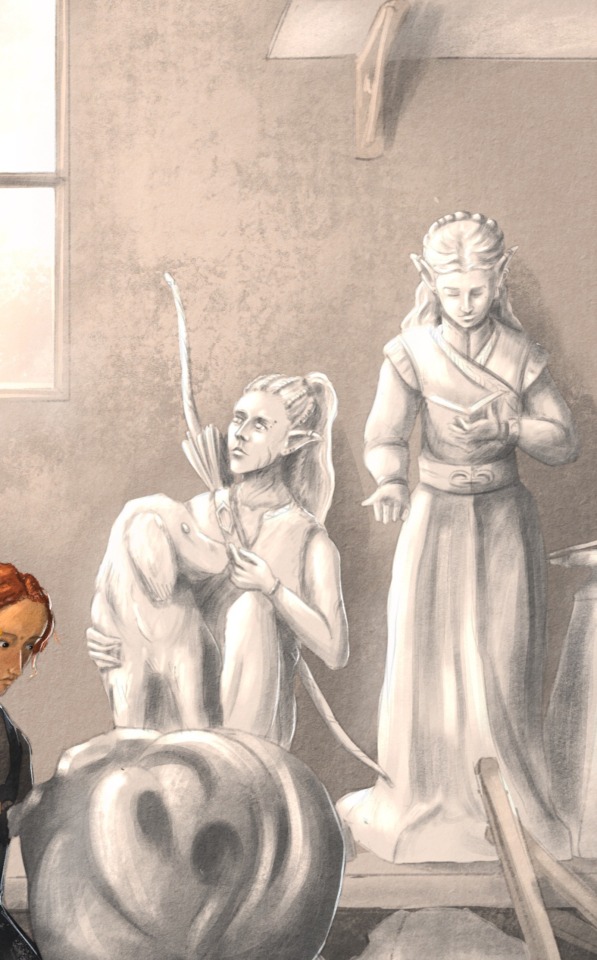
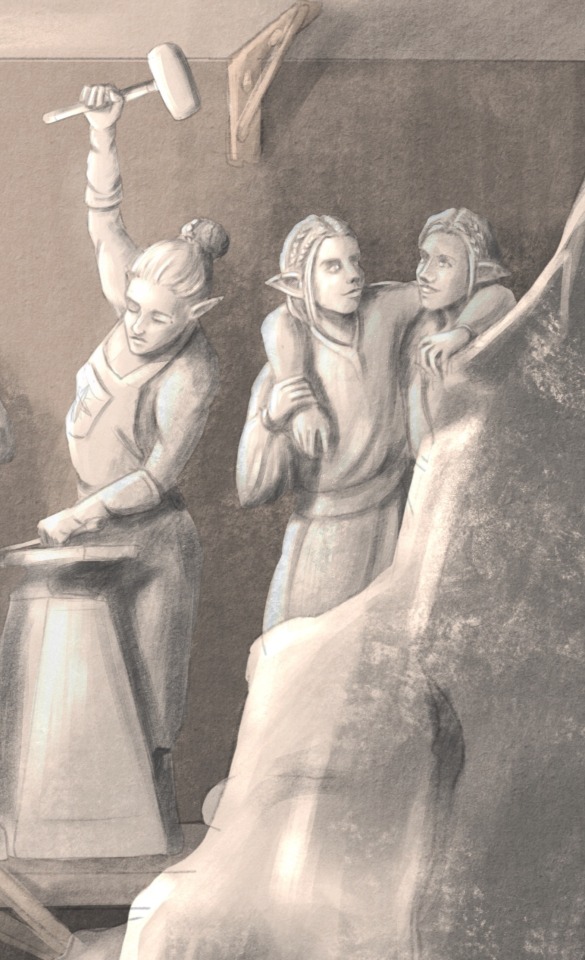
The statues in order: Fëanor, Maedhros, (Maglor), Celegorm&Huan, Caranthir, Curufin, Amrod and Amras. Feel free to zoom in, they are each pretty detailed.
This is the first time I've drawn any of the younger sons. I did Nerdanel and Fëanor, Maedhros, Maglor and Celegorm before, each in slightly different AUs, but desiging Caranthir, Curufin and Ambarussa was fun!
Maedhros is missing his hand and has scars, because while Nerdanel never saw it, Finrod came to tell her what he looked like after Angband. She first sculpted him with his hand, though, so I imagine taking a hammer to it must have been... a specific sort of pain.
Curufin is a mix of Fëanor and Celebrimbor, they all look like each other, but I headcanon that Fëanor was more thin and wiry (though still strong), while Curufin was a bit buffer, as he focused more on large works (weapons and infrastructure) than jewellery, and Celebrimbor who was a teen/young adult in the war put up more fat once in Ost-en-Edhil, after many years of privation.
I can never settle on Caranthir's craft/occupation, but it's something bookish. As for Ambarussa, I think Nerdanel just wanted to remember them as happy youths, rather than attach them to any activity.
#silmarillion#silm art#tolkien#tolkien fanart#the silmarillion#nerdanel#feanor#feanorians#maedhros#maglor#celegorm#curufin#caranthir#ambarussa#echo's drawings
1K notes
·
View notes
Text
But when the wolf came for Beren, Felagund put forth all his power, and burst his bonds; and he wrestled with the werewolf, and slew it with his hands and teeth; yet he himself was wounded to the death. Then he spoke to Beren, saying: ‘I go now to my long rest in the timeless halls beyond the seas and the Mountains of Aman. It will be long ere I am seen among the Noldor again; and it may be that we shall not meet a second time in death or life, for the fates of our kindreds are apart. Farewell!’ He died then in the dark, in Tol- in-Gaurhoth, whose great tower he himself had built. Thus King Finrod Felagund, fairest and most beloved of the house of Finwë, redeemed his oath; but Beren mourned beside him in despair.
At last Fingon stood alone with his guard dead about him; and he fought with Gothmog, until another Balrog came behind and cast a thong of fire about him. Then Gothmog hewed him with his black axe, and a white flame sprang up from the helm of Fingon as it was cloven. Thus fell the High King of the Noldor; and they beat him into the dust with their maces, and his banner, blue and silver, they trod into the mire of his blood.
But the jewel burned the hand of Maedhros in pain unbearable; and he perceived that it was as Eönwë had said, and that his right thereto had become void, and that the oath was vain. And being in anguish and despair he cast himself into a gaping chasm filled with fire, and so ended; and the Silmaril that he bore was taken into the bosom of the Earth.
hi I made a compilation
129 notes
·
View notes
Text
I Read The Silmarillion So You Don't Have To, Part Seven
Previous part.
Chapter 18: Of the Ruin of Beleriand and the Fall of Fingolfin
In which everything goes to hell. Again.
Remember the Siege of Angband? Yeah, that’s still going on. It’s been roughly two hundred years since Morgoth’s last attack (the first appearance of Glaurung the Dragon), and in all that time, the Elves haven’t made much progress. Fingolfin, the High King of the Noldor, considers launching another assault on Angband; his people are strong, and now they have the Men on their side. What Could Possibly Go Wrong?
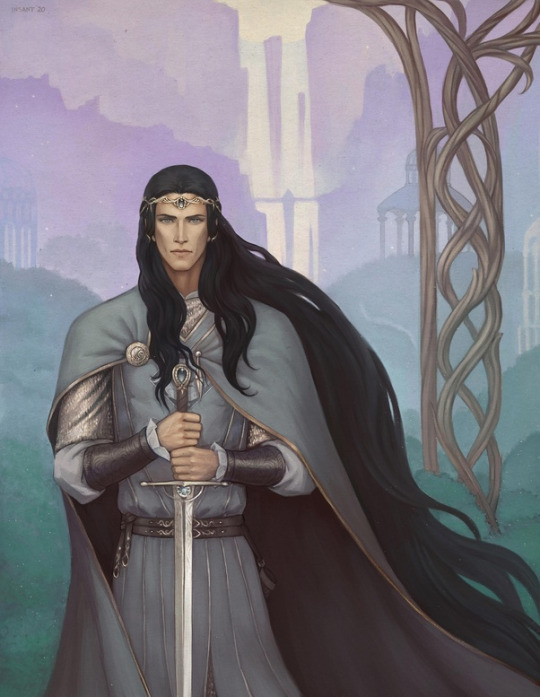
Fingolfin by Insant
The other Noldor are less enthused by this idea. For once, things are pretty great. Why risk the peace and prosperity that the Elves currently have for the chance at defeating Morgoth, when there’s bound to be massive loss of life either way? Only the Elven lords who live in the far north — on Morgoth’s doorstep — agree with Fingolfin, since they can’t ignore Morgoth as easily. They’re shot down by everyone else, so, there’s peace for a little while longer.
That’s when Morgoth makes his move.
Morgoth has been steadily gathering his forces throughout all of that time, and he’s also grown more and more spiteful. He doesn’t just want to defeat the Noldor, he wants to defile their homeland. But his hatred has also made him impatient.
One winter, on a dark night, without any warning, rivers of lava suddenly come pouring down the Thangorodrim, which belch poisonous gases into the air, rendering the whole plain of Ard-galen a barren wasteland overnight. Also, unlike with natural volcanoes, the damage is permanent — Ard-galen becomes known as Angfauglith, which means “Gasping Dust.” Instant Mordor, Just Add Lava. Many poor Elves are swallowed up by the lava before they can react.
As if that weren’t bad enough, Glaurung returns, accompanied by Balrogs and entire armies of Orcs — more Orcs than the Noldor have ever previously seen. The ensuing battle lasts all winter, as Morgoth’s forces return fire on the Noldor. It becomes known as Dagor Bragollach, the Battle of Sudden Flame.
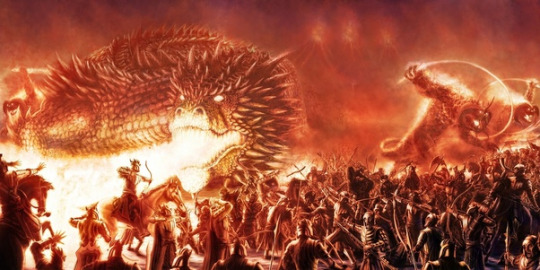
Battle of Sudden Flame by Jovan Delic
There are many casualties. Angrod and Aegnor, the brothers of Finrod and Galadriel, both die in the battle. Finrod himself gets cut off in the Fen of Serech, and almost dies, but he’s rescued at the last minute by a Man named Barahir. Finrod escapes with his life, barely, and manages to make it back to his palace in Nargothrond. Finrod pledges undying friendship to Barahir, promises to help him and his family in return if they should ever need him, and gives him his ring as a token of his promise. It’s a ring shaped like two intertwined snakes, set with green stones, and it becomes known as the Ring of Barahir.
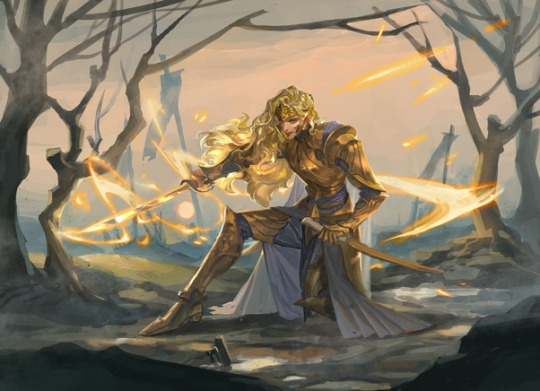
Finrod in the Fen of Serech by pansen1802
Incredibly, Fingolfin and co. manage to hang on to their land of Hithlum, but not without heavy losses. Hador Lórindol, one of the Kings of Men who was Fingolfin’s thane, dies in the battle. In the East, Fëanor’s sons aren’t doing great, either — Celegorm and Curufin are both defeated, but not killed; they retreat all the way to Nargothrond and hide there with Finrod. Caranthir’s land is ravaged, too.
Maedhros, however, “burned like a white fire.” He’s been dying to get his revenge on Morgoth for having strung him up on Thangorodrim, and personally slaughters so many Orcs that they start to run in fear of him. He manages to hang on to his fortress, and many people rally to him, including his brother Maglor.
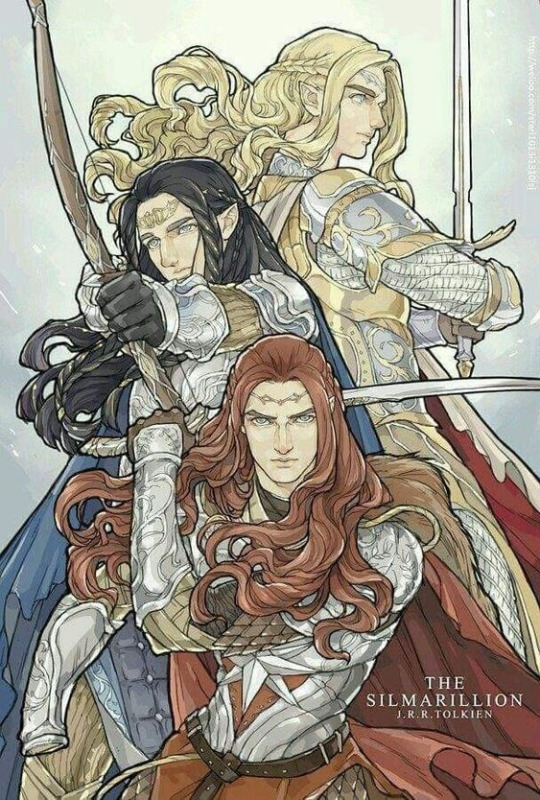
Finrod, Fingon, and Maedhros by star热爱生活呀巴扎嘿
Overall, the battle is really bad. Fingolfin stares out over the ruined lands, sees his family scattered, and realizes the Noldor are done for. He’s filled with rage and despair, but he isn’t ready to give up yet. There’s only one thing to do. He mounts his horse, Rochallor, and rides straight to the gates of Angband. Those who see him think he must be Oromë, the Vala of the hunt, because he burns with fury and his eyes glow. He blows his warhorn, bangs on the gates of Angband, and challenges Morgoth himself to a duel.
That may be the ballsiest move of any Elf so far (and yes, I’m counting Fëanor going up against an army of Balrogs).
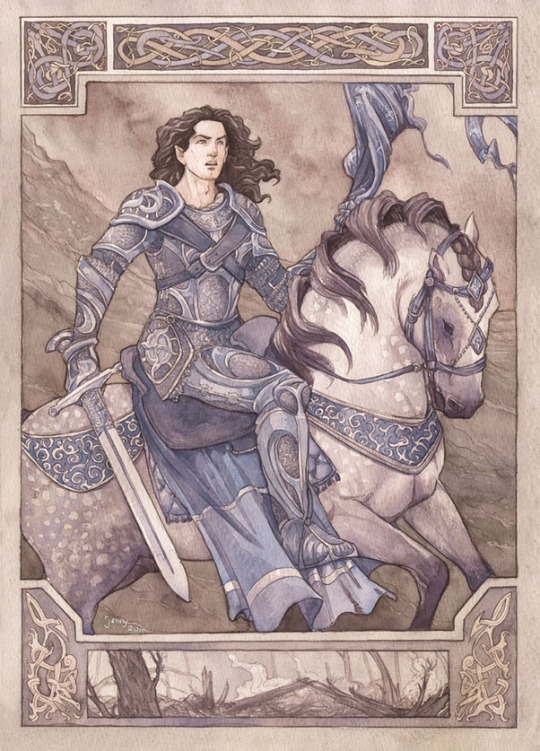
Fingolfin’s Challenge by Jenny Dolfen
Now, throughout all this, Morgoth has spent most of his time hiding in his fortress. Sure, he’s a Vala, and technically the most powerful being in Middle-earth, but he doesn’t fight his own battles. Fingolfin calls him a coward who’d rather send out all of his evil minions to fight for him than come and face him like a man. Morgoth can’t ignore that. So, to the surprise of everyone, Morgoth actually comes. And we get this badass description, which I’m going to transcribe, because I can’t do Tolkien justice:
Therefore Morgoth came, climbing slowly from his subterranean throne, and the rumour of his feet was like thunder underground. And he issued forth clad in black armour; and he stood before the King like a tower, iron-crowned, and his vast shield, sable-blazoned, cast a shadow over him like a stormcloud. But Fingolfin gleamed beneath it as a star; for his mail was overlaid with silver, and his blue shield was set with crystals; and he drew his sword Ringil, that glittered like ice.
Oh, it is on!
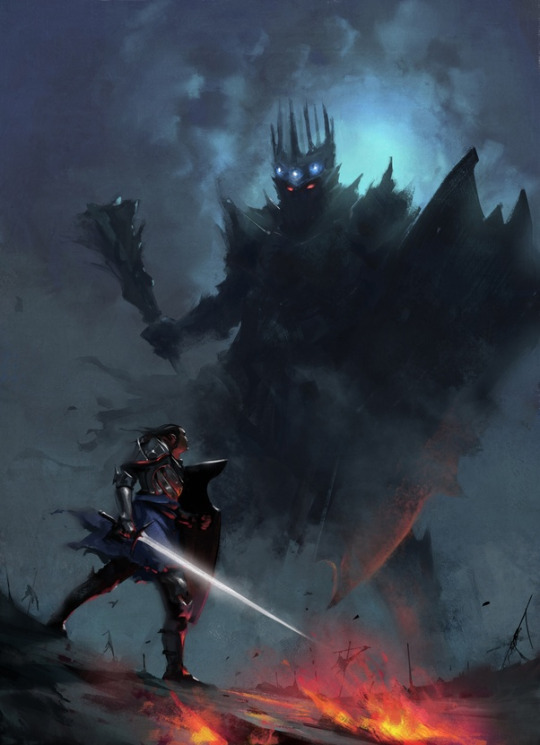
Fingolfin vs. Morgoth by Marchesi

The Fall of Fingolfin by Wavesheep
The battle is epic. Morgoth tries to smash Fingolfin with his hammer, called Grond (GROND! GROND! GROND! GROND!), but Fingolfin is too quick. Every time GROND hits the earth, it creates a volcanic cleft in the earth. The battle is compared to a thunderstorm, with the strikes of Morgoth’s hammer being the thunder and Fingolfin darting around being the lightning. Fingolfin actually manages to wound Morgoth, seven times! Each time, Morgoth howls so loud that all of the Orcs cringe in fear.
Fingolfin can’t keep it up forever, though. He’s mortal, and he’s going up against something near to a god. Three times, Morgoth crushes him with his shield, and three times Fingolfin is able to pick himself back up again. He doesn’t have much space to move anymore, because the ground around him is full of holes. He stumbles and falls, and Morgoth presses his foot to Fingolfin’s neck. It’s like getting an entire hill dropped on top of him. Fingolfin isn’t going to go peacefully, though — with his last bit of strength, he cuts deep into Morgoth’s foot.
Fingolfin dies, and thus passes the strongest and most valiant of the Elven kings. The Elves are so sad to lose him that they don’t even sing about the battle. The Orcs don’t gloat about it, either, even though Morgoth won — it was kind of a Pyrrhic victory, because it’s embarrassing that a mere mortal was able to do so much damage to Morgoth. The reason why we know what happened, despite the lack of songs about it, is because Thorondor (the King of the Eagles) brings the news to Gondolin and Hithlum.
Thorondor also saves Fingolfin’s body from being desecrated by Morgoth. Morgoth goes to throw Fingolfin’s corpse to the wolves, but Thorondor swoops down and claws him in the face. Thorondor brings Fingolfin’s body to Gondolin, and Turgon builds a cairn for his father in the surrounding hills. For a while, Fingolfin’s tomb acts almost like a charm that keeps the Orcs away. (But not forever though. Because, in case you forgot, Gondolin is doomed.)
Morgoth’s wounds are permanent. His seven initial wounds never heal, he now limps everywhere he goes because Fingolfin damaged his foot, and his face is also scarred where Thorondor got him.
All of Hithlum mourns Fingolfin’s death. Fingon, in his grief, becomes the sole High King of the Noldor.
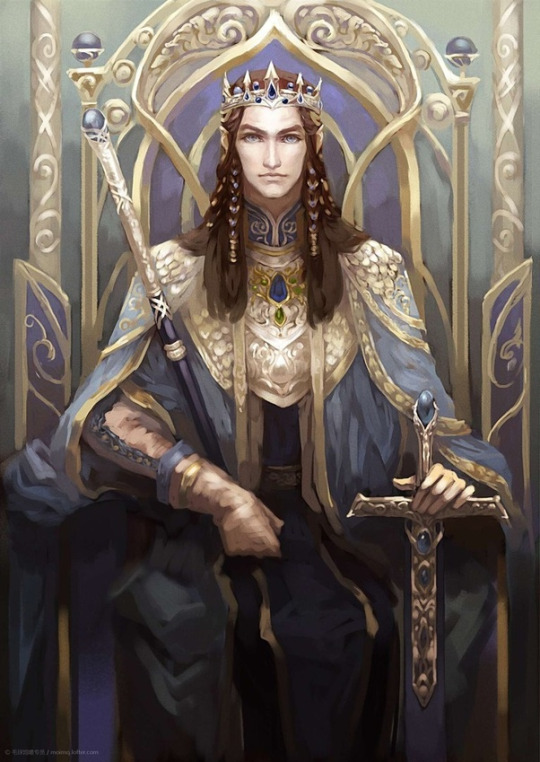
Fingon by Moimq
There’s an interesting note here: Fingon sends “his young son Ereinion (who was later named Gil-galad) […] to the Havens.” This is an outright inconsistency. In other sources, Gil-galad is the grandson of Angrod, Finrod’s brother. So, it’s legitimately unclear who Gil-galad’s father was. Oh well. Distant legendary past, oral tradition and all that. I’m sure the songs disagree on whose parents are whose all the time.
And, the “Havens” referred to here aren’t the Grey Havens, either. They’re two cities in the southwest of Beleriand. But they’re ruled by the same Elf, Círdan, who would rule the Grey Havens later.
Morgoth is now in control of most of northern Beleriand. Barahir, the Man who helped save Finrod, keeps fighting for some time, alongside his wife Emeldir. But Morgoth destroys their land little by little. That land becomes so dark and evil that even Orcs avoid it, and it gets a new name: Taur-nu-Fuin, “The Forest under Nightshade” (which is cool as hell). This forest is like a proto-Mirkwood. Its trees become tangled with claw-like roots and branches, and it becomes full of angry spirits that can drive travelers mad.
The situation gets so dire that Emeldir leads her people away. They end up in the Forest of Brethil, which is where Haleth, another badass warrior-queen of Men, led her people in a similar moment of desperation. All of Barahir’s men are killed fighting Morgoth except for a small handful (whose names are all listed, of course). The Elves don’t come to help them, so they become desperate, hunted outcasts who live in the wilderness. One of these outcasts is Beren, Barahir’s son, who’s about to become very important.
The Elves managed to maintain control over Minas Tirith, the tower that guards the pass separating Morgoth’s lands in the north from the rest of Beleriand. This tower is maintained by Orodreth, Angrod’s son and Finrod’s nephew. But after two years pass, the tower is besieged by Morgoth’s lieutenant, Sauron.
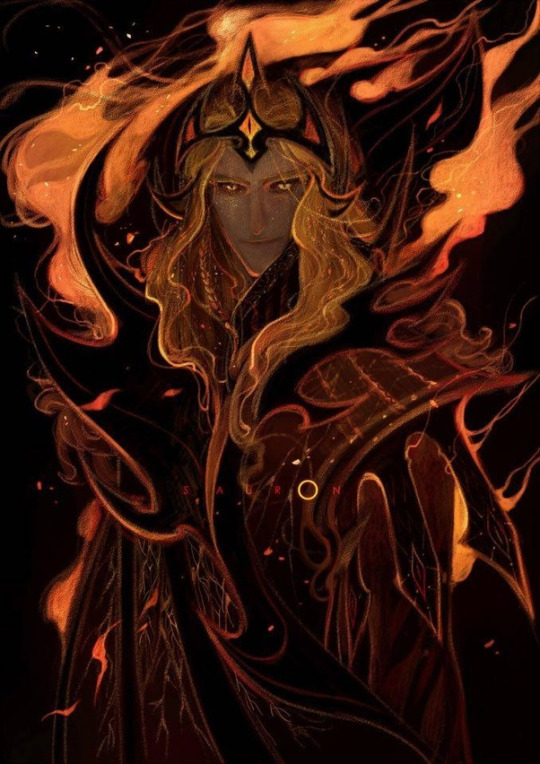
Sauron by Wavesheep
(Oh yeah I’ve been waiting to dip into my self-indulgent collection of Sauron pictures.)
At this point, the Elves call Sauron “Gorthaur the Cruel.” He has become…
a sorcerer of dreadful power, master of shadows and of phantoms, foul in wisdom, cruel in strength, misshaping what he touched, twisting what he ruled; his dominion was torment.
He’s basically like Morgoth 2.0, and there’s very little left of him that is still Mairon, the Maia smith that he once was. Still, Sauron and Morgoth aren’t interchangeable; while Sauron is certainly very evil, he doesn’t think the same way that Morgoth does. If you’re familiar with the D&D alignment chart, Morgoth is pure Chaotic Evil — he doesn’t have a motive beyond fucking things up as much as possible. Sauron is more Lawful Evil, more like an evil dictator. Morgoth wants to watch the world burn (and just did, a moment ago); Sauron wants to rule over the ashes.
Sauron’s assault on Minas Tirith is successful. (If Sauron had a nickel for every time he besieged a tower called Minas Tirith, he’d have two nickels, which isn’t a lot, but it’s weird that it happened twice.) He conjures a cloud of pure terror that causes Orodreth and his men to panic, and flee to Narthothrond. Then, much like Sauron would corrupt Minas Ithil and Osgiliath eons later, he transforms Minas Tirith into an evil watchtower. Tol Sirion, the island where it’s located, becomes known as Tol-in-Gaurhoth, the Isle of Werewolves.
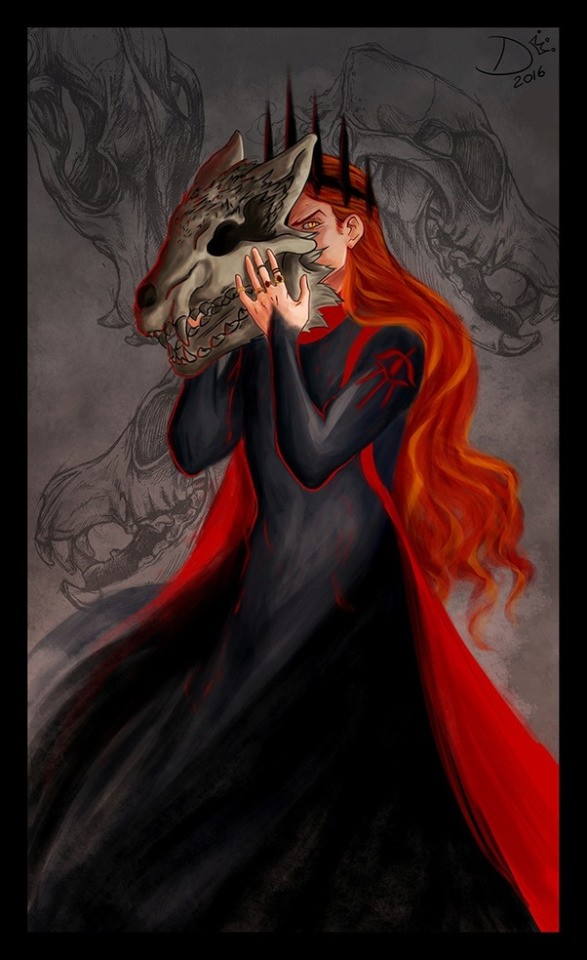
Lord of Werewolves by Dracontessa
After that, things only get worse. The Orcs spread across Beleriand, kidnapping Elves and desecrating all the land around Doriath. Morgoth sends out a bunch of spies to sow discord in every kingdom, hoping to win a psychological battle. Because of the Curse, most of the Noldor believe the sugary lies. The dirtiest trick that Morgoth pulls is setting free some of the Elves that he took captive, while keeping them under his control. This causes the Noldor to distrust even their own families.
With Men, Morgoth tries a different tactic. He attempts to turn them against the Elves by pointing out that the Men are inferior to Elves, and that the Noldor are inherently untrustworthy and untrusting. He promises the Men that if they come and join him, “the rightful Lord of Middle-earth,” then they’ll have honor and rewards and yada, yada. The Men don’t fall for this, which makes Morgoth even more spiteful towards them.
The Three Great Houses of Men are in complete disarray at this point. The house of Bëor —Barahir and his people — is basically destroyed, with the remainder barely surviving in the wilderness. The House of Hador are all stuck in Hithlum, and Hador himself is dead. The only remaining Men in the rest of Beleriand are the house of Haleth — the Haladin — who live in the Forest of Brethil. They’re one of the last lines of defense between Nargothrond and Morgoth’s onslaught. Hador’s grandsons, Húrin and Huor, are camped out in the Forest of Brethil with the Haladin. Halmir, the current leader of the Haladin, sends for backup, and a small army of Sindar Elves from Doriath come to help defend the forest. With the Elves’ help, the Men drive back the Orcs.
Húrin and Huor are some of our major players among the Men. They’re brothers, and they’re currently teenagers. Back before the battle, their father married Halmir’s daughter, so they’re members of the Haladin on their mom’s side. During the battle, they are separated from the rest of their company, but Ulmo protects them with a magical mist from the River Sirion, and then Thorondor rescues them when they wander near his mountains. Thorondor sends two eagles to pick them up, and the eagles bring them to Gondolin. Húrin and Huor become the first Men to ever see the secret Elven city of Gondolin.
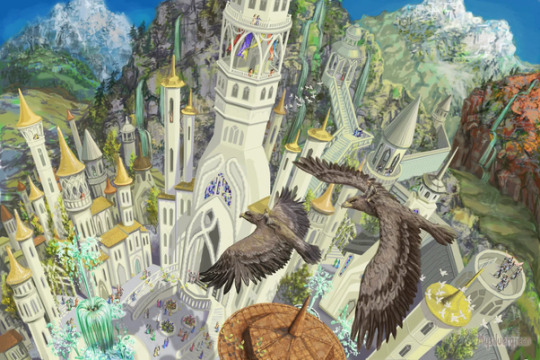
By Mysilvergreen
King Turgon receives them well. He’d gotten a prophetic dream from Ulmo, telling him he’ll need the Men’s help when things get bad, so he takes them in as his honored guests. Húrin and Huor live in the mystical Elven city for a year, and they learn a lot from Turgon in that time. Turgon wants to keep them in Gondolin, not just because of his proclaimation that no one can ever leave it, but also because he genuinely loves them. Eventually, though, they want to go home.
Remember how well that went the last time, with Aredhel?
Húrin reminds Turgon that Men don’t live very long, so he and his brother can’t just wait until things cool off, especially with their family thinking they’re dead. Also, they were carried into the city by eagles, so they have no idea where the entrance is and probably couldn’t find it again on their own. Turgon thinks that this is reasonable, and agrees to let them go, so long as Thorondor is willing to let them leave the way they came, by eagle-taxi.
But Maeglin — remember him? He’s the edgy Elf — Maeglin is happy that Húrin and Huor are leaving, because they’ve been soaking up all the king’s attention. Maeglin snidely tells Húrin that Turgon wasn’t so lenient in the past, like that time he threw Maeglin’s father off the walls.
To pacify Maeglin, Húrin and Huor swear an oath not to reveal anything about Gondolin. As you’ve probably gathered by now, oaths are serious business. I almost guarantee that this is going to bite them in the ass.
When Húrin and Huor return home, their family is overjoyed to see them, because they all thought that the brothers had died in the wilderness. Their father, Galdor, asks where they’ve been, and why they look like princes instead of like they’ve been living in the wilderness for a year. Húrin tells him that the only reason they were allowed to return at all was if they swore not to speak about it, so… don’t ask.
Meanwhile, King Turgon learns that the Siege of Angband is officially over, and Morgoth killed Fingolfin. Turgon doesn’t want to involve himself in the war, at least not yet — Gondolin is a secret safe haven for now, and he wants it to stay that way for as long as possible. It’s like the Wakanda of Elven cities.
However, Turgon also realizes that this is the beginning of the end for the Noldor, unless they can find some outside source of help. He sends secret bands of Gondolin Elves to sail to Valinor. That’s a truly desperate move, since the Noldor are exiles, and Valinor has wanted nothing to do with Middle-earth for centuries. Unfortunately, none of Turgon’s emissaries make it; the western sea has become much more dangerous ever since Valinor cut itself off. The sea is full of enchantments and illusions, and Valinor itself is hidden. There’s no way to get to it. With every failed mission, Gondolin’s doom inches closer and closer.
Guess who hears about it? Morgoth. Morgoth is very interested to know what happened to Finrod and Turgon, because Elven kings don’t just vanish off the face of the earth. He knows they must be somewhere, probably plotting a new scheme to take him down. He knows what Nargothrond is, but not where it is, and he knows nothing about Gondolin. In the Battle of Sudden Flame, he made the mistake of underestimating the strength of the Elves and Men. Although he won the battle, they managed to hit him back just as badly. He’s not about to make that mistake again.
Morgoth attacks Hithlum again. King Fingon is outnumbered, but rescued at the last minute by ships full of warriors sent by Círdan. The Elves win the battle, but King Galdor, Húrin and Huor’s father, dies in the same spot where his own father fell during the Battle of Sudden Flame. Húrin becomes the new patriarch of his house, and serves as Fingon’s thane. He marries Morwen Eledhwen, a woman of the house of Bëor, who fled the Forest under Nightshade for the Forest of Brethil alongside Queen Emeldir.
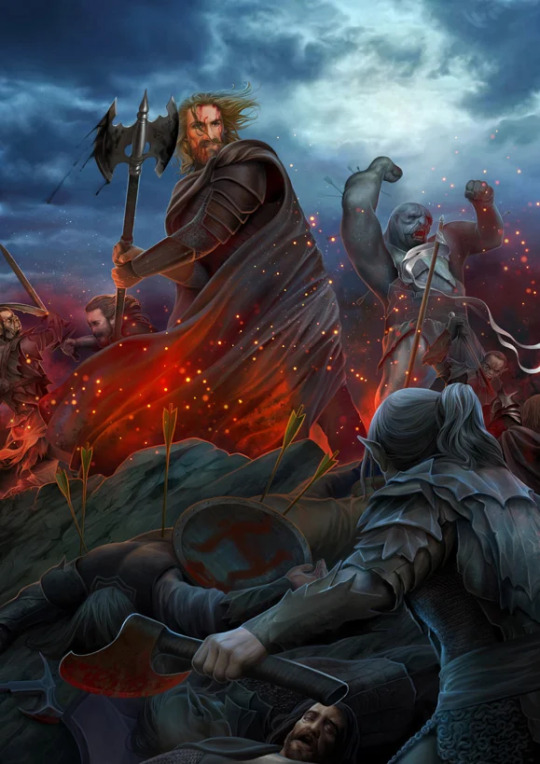
Húrin by Steamey
The House of Bëor is by this point reduced to only one man, Emeldir and Barahir’s son, Beren.
Chapter 19: Of Beren and Lúthien, Part One
In which we hear the greatest love story ever told.
This is the first of what Tolkien called “The Great Tales,” some of the oldest stories in the Legendarium, all of which were ultimately unfinished. To put into perspective just what a big deal this story is, Tolkien and his wife Edith have the names “Beren” and “Lúthien” written on their respective headstones. The version here in the Silmarillion is the most complete, but it’s also an abridged version. This is how Tolkien introduces it:
Among the tales of sorrow and of ruin that come down to us from the darkness of those days there are yet some in which amid weeping there is joy and under the shadow of death light that endures. And of these histories most fair still in the ears of the Elves is the tale of Beren and Lúthien.
Most of my retelling here is paraphrased from the Silmarillion, but I’ve included some details that appear only in the Lay of Leithian, Tolkien’s unfinished poetic telling of the story. It’s really worth going and reading the Lay of Leithian; it’s extremely vivid and evocative, it perfectly imitates the medieval poetic form.
The story doesn’t actually start with Beren. It starts with an account of what happened to Barahir and his remaining men after they fled the Forest under Nightshade. They ended up camping out beside a lake called Tarn Aeluin, which is beautiful and reflects the stars. It was supposedly blessed by Queen Melian, and her magic repels the evil creatures that took over the rest of the forest. Barahir and co. are well hidden there, but Morgoth commands Sauron to find them.
One of Barahir’s people is a man named Gorlim, who has a wife, Eilinel. They love each other even despite the war, but when Gorlim returned home one day after a battle, he found his house empty and Eilinel gone. He still follows his people and hides out near the lake, but he holds out hope that maybe his wife isn’t dead. He periodically leaves the secret safe haven and returns to the empty house, hoping that his wife will be there. One time, he sees the lights on and hears her voice, but it’s a trap — Sauron found him. Sauron tortures Gorlim to force him to reveal the location of Barahir’s secret camp, but Gorlim holds out. That is, until Sauron tells him to name his price. Gorlim asks to see his wife again.
Then Sauron smiled, saying, “That is a small price for so great a treachery. So shall it surely be. Say on!”
Poor Gorlim reveals the location of Barahir’s camp. Then, with a mocking laugh, Sauron reveals that Eilinel is dead, and that he cast an illusion to ensnare him. “Oh, but don’t worry, I’ll still send you to her,” he says, and then kills him. They don’t call him Gorthaur the Cruel for nothing.
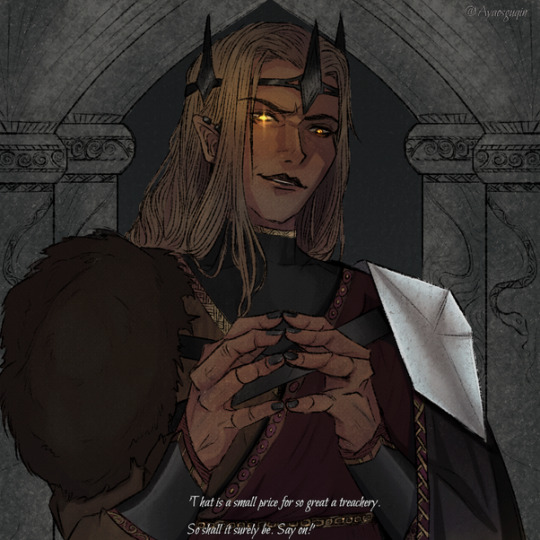
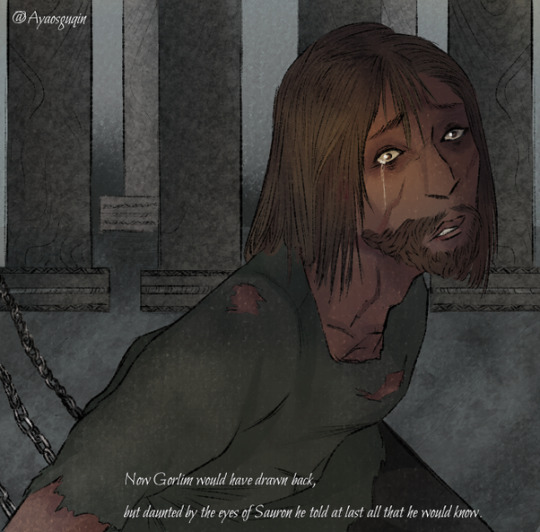
By @ayaosguqin
See, this is one of the things that makes Sauron different from Morgoth. Morgoth is spiteful and enjoys sewing discord and causing destruction for the sake of it, but we haven’t seen this kind of calculated sadism from him yet. (There’s not much that’s subtle about busting in with a giant spider and killing trees.) Sauron, having been a Maia of Aulë, has an appreciation for subtlety and craftsmanship. Sauron likes to stick the knife in and twist it. And as The Lord of the Rings makes clear, he’s a master of psychological warfare.
Now that Sauron knows where the secret camp is, his forces attack the men at Tarn Aeluin. They massacre everyone, save Beren. Beren is out on a spy mission when the Orcs attack, and he has a dream in which Gorlim’s ghost appears to him to tell him what happened. Beren rides back, but it’s already too late. He finds his father and everyone else dead.
Beren builds a cairn for his father and swears vengeance. He hunts down all the Orcs, slaughtering them by himself. He sneaks near their camp, where they’re gloating and holding up his father’s hand as a trophy. On the severed hand is a ring, the ring that Finrod Felagund gave to Barahir. Beren swoops in, steals the hand with the ring, and runs off before the Orcs have a chance to react.
Beren lives by himself in the wilderness for some time. He befriends the animals, and becomes a vegetarian as a result. He manages to perform many heroic deeds just in that time, so that he becomes famous. He’s already such a legend that Morgoth puts a price on his head, just as high as that of King Fingon himself, but the Orcs are so afraid of Beren that they avoid him instead of hunting him. Morgoth resolves to send an entire army after Beren, and not just any army — an army of werewolves, captained by Sauron himself.
The werewolves are enough to chase Beren away from the land where he buried his father. He heads south, towards Doriath. He resolves to pass through Queen Melian’s magic wall, for some reason. (Maybe because it’s the only guaranteed safe place?) He travels along sheer mountain cliffs, and through the spider-infested wastes that had been twisted by a combination of Sauron’s magic and Melian’s magic. That land was basically the Mordor of its day, and no one knows how Beren got through it; whatever he experienced there was terrifying enough that he never spoke of it again. When he arrives at the magic wall, he passes right through like it isn’t even there. This event had been predicted by Melian herself: ‘because the power of that Man’s destiny will overcome her own. People will sing about that event until the distant future, when Middle-earth is unrecognizable.’
He finds himself in the north of Doriath, a forest called Neldoreth. He’s exhausted and harrowed, having spent years traveling through a cursed land. But everything in Neldoreth is beautiful, it’s summertime, and Beren sees a beautiful Elf maiden dancing on the grass. It’s Lúthien, the daughter of King Thingol and Queen Melian themselves. Lúthien is the most beautiful person alive. (Like, metaphysically.) Being the child of a Maia, she is more or less a demigoddess.
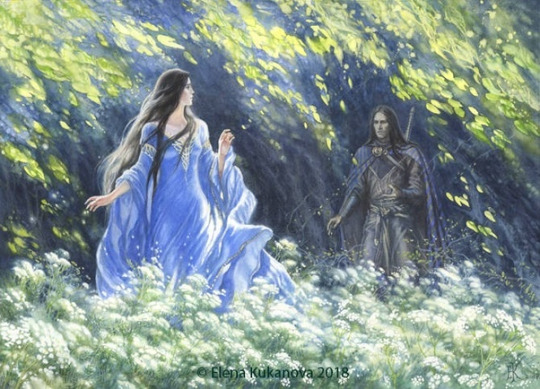
Encounter of Beren and Lúthien by Elena Kukanova
Beren is instantly smitten. In fact, he’s literally enchanted by her — just watching her casts a spell on him. When she suddenly vanishes, he literally can’t speak. He wanders the woods like an animal, searching for her. He doesn’t know her name, so he calls her Tinúviel, which means “Nightingale” in Sindarin. A whole year passes, and he sees her in the beauty of nature around him, like she’s a ghost and he’s fondly recalling her memory. A whole winter later, she reappears, and sings a song so beautiful that it brings spring back to the woods:
Keen, heart-piercing was her song as the song of the lark that rises from the gates of night and pours its voice among the dying stars, seeing the sun behind the walls of the world; and the song of Lúthien released the bonds of winter, and the frozen waters spoke, and flowers sprang from the cold earth where her feet had passed.
When he hears her song, Beren can suddenly speak again. He calls out to her, using the name “Tinúviel.” Luckily for him, Lúthien falls just as in love with him upon seeing him. The narrator says that “doom fell upon her” as soon as she loved him back, which could mean either that she met her destiny or that she is going to die for her love. Probably both.
Beren goes to embrace her, but she vanishes again as soon as day breaks. Beren immediately feels a mixture of ecstasy and anguish. He falls into a coma, and has nightmares about groping through the dark to find the
vanished light. (I’m starting to note parallels between Lúthien and the Two Trees, and also the Silmarils.) But Beren’s anguish is nothing to Lúthien’s. Now that she’s fallen in love with a mortal, her fate is inextricably intertwined with his. She’s no longer free.
Lúthien returns to Beren and wakes him from his coma. They walk through the woods together, blissfully in love, throughout that spring and summer. Presumably they talk and actually get to know each other in that time.
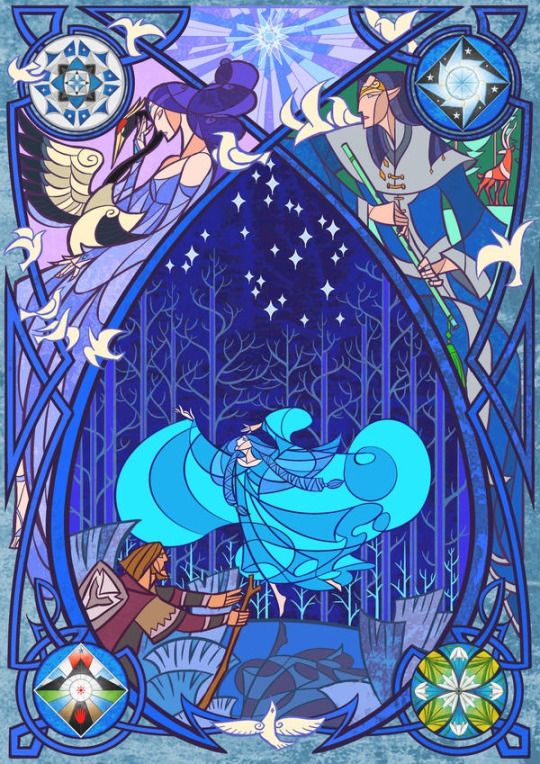
A sudden in love by breath-art and aglargon
There’s another person who loves Lúthien, an Elven bard named Daeron. He spies on Beren and Lúthien in the woods. Jealous that Lúthien loves Beren instead of him, he goes and tattles to Thingol about their relationship. (In the Lay of Leithian, Daeron — in his envy — is able to cast a spell of silence upon Beleriand, so that there is no music or even birdsong.) Thingol is immediately furious, because he’s extremely overprotective of his daughter, and he hates Men. He confronts Lúthien about her new boyfriend, but she refuses to say anything until Thingol promises that he won’t hurt or imprison Beren. Lúthien personally leads him before her father’s throne.
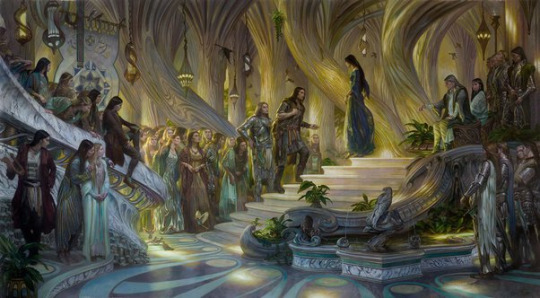
Beren and Luthien in the Court of Thingol by Donato Giancola
Thingol demands to know who Beren is, but he’s so intimidating that Beren is stunned into silence. Lúthien answers for him. Thingol tells Lúthien to back off and let Beren speak for himself. What’s Beren’s excuse for entering the forbidden realm of Doriath? Beren’s response is very poetic and eloquent, but basically boils down to “I want to fuck your daughter.”
There’s pin-drop silence in the hall as the assembled Elves wait for Thingol to smite Beren. Thingol immediately regrets his promise not to harm him. Thingol’s response is to fold his hands, smile coldly, and say,
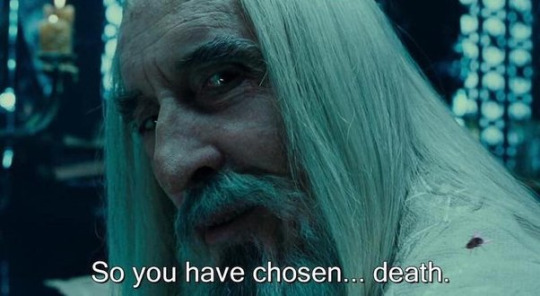
(I mean, it’s not these exact words, but it’s close enough.)
Thingol accuses Beren of being a spy and a thrall of Morgoth, at which Beren takes offense. Beren isn’t afraid of death, but he won’t allow himself to be insulted by any Elf, even a king. His father was a lord of Men and he deserves to be treated like a prince! He has a ring given to his father by Finrod himself, for Eru’s sake! He holds up the ring, and all the Elves see it. This is the Ring of Barahir, which will eventually get passed down to Aragorn. The jewels set in it were originally cut by the Noldor in Valinor itself.
Melian whispers to her husband that he won’t be the one to kill Beren. Beren has a lot more stuff he’s destined to do, but his destiny is still intertwined with Thingol’s. Whatever Thingol does next will seal his own fate, too. Thingol proceeds to choose the stupidest thing possible.
Beren wants to marry the Faerie King’s daughter. So, as is common in fairy tales, Thingol sets him an impossible task that he must complete to earn Lúthien’s hand: He must steal a Silmaril from the crown of Morgoth. Thingol feels like this the nearest thing to a fair price for his daughter. Of course, like most mythological kings, he’s hoping that Beren will die in the attempt.
You can just hear Melian’s facepalm through the page.
As is hopefully clear by now, the Silmarils are like a bomb waiting to go off. Everything about them is fraught — from the fact that they contain the last light of the Trees, to Morgoth’s obsession with them, to the Curse laid on all Fëanor’s sons for their unbreakable oath to get them back, etc. etc. Thingol’s choice to get involved in that shitshow was a dumb fucking idea. It’s not really his place to say or do anything concerning the Silmarils, and he effectively dooms his own kingdom by involving himself with them. In fact, by doing so, Thingol subjects himself to the same Curse that affects all the Noldor — you know, the reason he banished them from his kingdom and banned their language in the first place.
But that’s getting ahead of ourselves. Let’s get back to Beren, who responds to this by literally laughing it off and calling it easy:
“For little price,” he said, “do Elven-kings sell their daughters: for gems, and things made by craft. But if this be your will, Thingol, then I will perform it. And when we meet again my hand shall hold a Silmaril from the Iron Crown; for you have not looked the last on Beren son of Barahir.”
I like the parallelism here: Both Beren and Sauron call something that’s extraordinarily valuable to someone else a “little price” or “small price.” Obviously, we’re supposed to side with Beren in this instance, but I wonder if his pride will be his fall.
Having received his main quest, Beren leaves Menegroth.
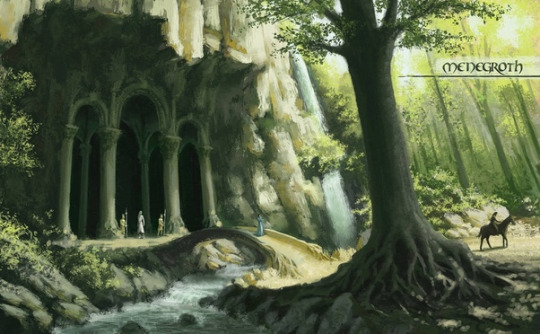
Menegroth by David Gresit
Melian tells Thingol what an idiot he is for involving himself in the Main Plot and forsaking his kingdom’s safety in isolation. She can’t protect him from whatever happens next. Thingol is pretty confident that Beren’s going to die, which proves that he’s not Genre Savvy enough to make good decisions from here on out. He should really listen to his wife.
Lúthien doesn’t quite enter “but Daddy, I love him!” territory, but she does stop singing. All of Doriath is eerily silent.
Beren travels west, towards the River Sirion, and then to Nargothrond. Being alone and with no resources, he doesn’t have any other option but to go to Finrod for help. He wisely holds up the Ring of Barahir as he enters Finrod’s territory, because it was originally Finrod’s ring, and his Elf snipers would know not to shoot. Knowing that he was being watched by an army’s worth of hidden Elves, he randomly yells out “I am Beren son of Barahir! Take me to your King!” in the middle of a field in the hopes that someone will hear him and decide not to kill him. After doing this several times, he’s apprehended by the archers and taken to Finrod.
Finrod receives Beren warmly. Privately, Beren tells Finrod about his father’s death and about meeting Lúthien. He cries more over remembering Lúthien than remembering his father. Remember, Finrod promised to help Barahir or any member of his family in need, because they had saved him. So, he has no choice but to help Beren retrieve a Silmaril, even though he knows it will not go well.
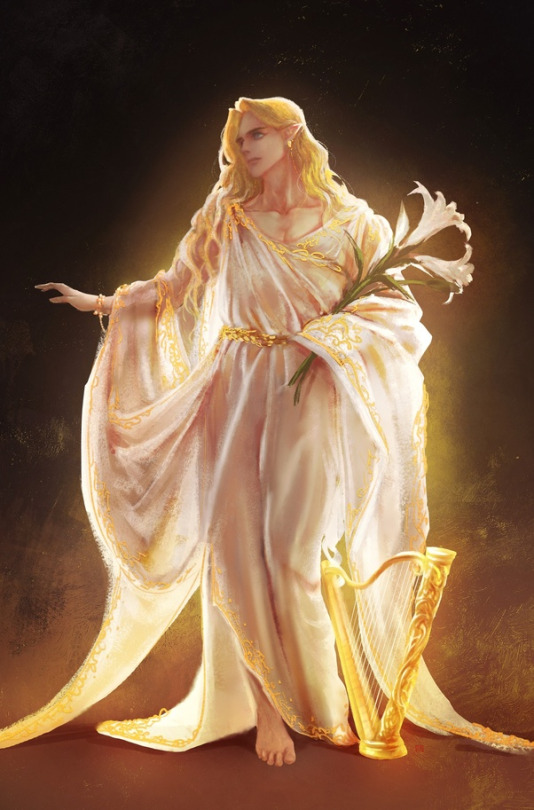
Finrod by yidanyuan
He tells Beren, ‘Well, it’s obvious that Thingol wants you dead, but if anyone so much as mentions the Silmarils, the sons of Fëanor are on them like a pack of wolves. Celegorm and Curufin are powerful lords in my court, and I can’t risk antagonizing them. If they find out you want a Silmaril, they’ll kill you. But I made a promise to your father, so I have to help you. In short, we’re all screwed.’
For some reason, Finrod decides that the best thing to do is to be as transparent as possible. So, he summons his court and stands before his people. He tells them all about the promise he made to Barahir, and how he is therefore obligated to help Beren. He asks his lords for help. Celegorm’s response is predictable. He repeats the Oath of Fëanor, reaffirming that the sons of Fëanor will hunt down anything alive that dares to seek a Silmaril. He goes on a tirade as impassioned as the one that Fëanor originally gave to the Noldor back in Valinor. (Like father, like son, I guess.) Then Curufin speaks, more quietly. What he says boils down to: ‘Nice kingdom you’ve got here, Finrod. Would really be a shame if something happened to it.’
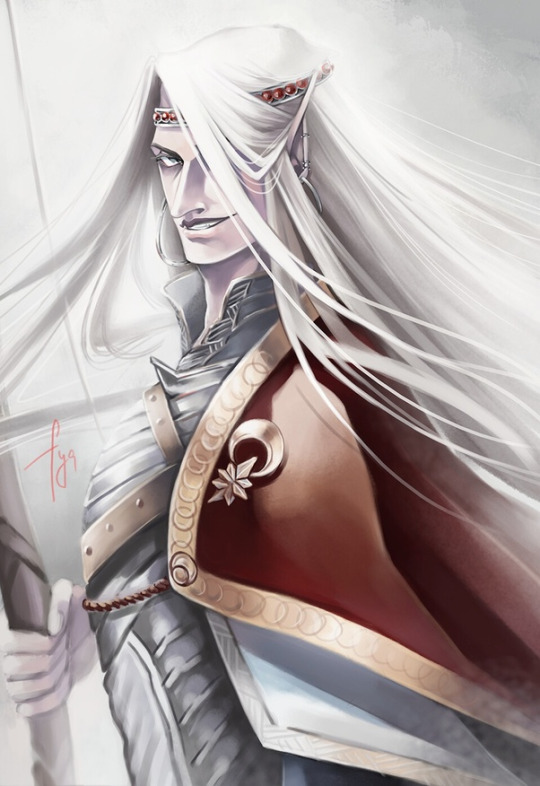
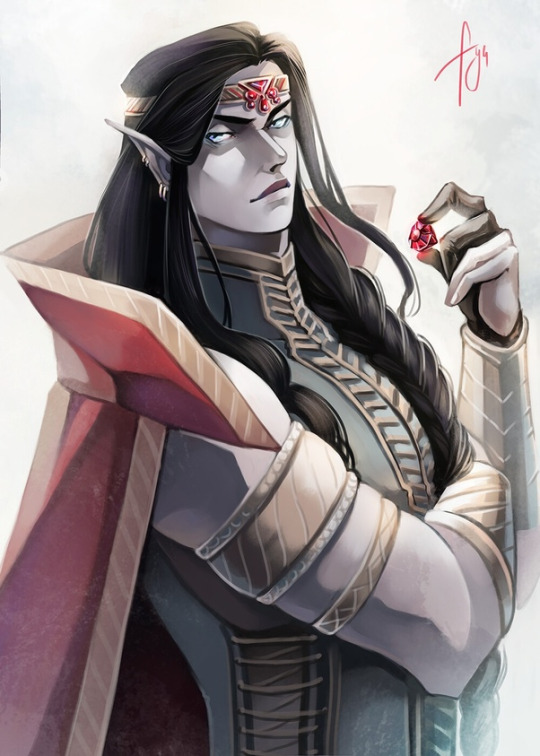
Celegorm and Curufin, by Julia Reizen
Curufin’s speech scares the Elves of Nargothrond so much that they avoid open war for decades, preferring guerilla warfare with arrows, poisoned darts, and magic. According to Tolkien, this is less valorous than open combat, and diminishes their whole society.
Say what you will about Fëanor and his brood, they’re damn good at public speaking.
The Elves of Nargothrond begin to murmur amongst themselves that Finrod can’t tell them what to do as though he’s a Vala (even though he’s… y’know… the king), and all of them refuse to help him. The Curse is in full effect: Celegorm and Curufin realize that this is a golden opportunity to send Finrod alone to his death, and take over Nargothrond for themselves.
Finrod reads the room. He takes off his crown, and throws it at his feet, renouncing his rulership of the kingdom that he built. He looks directly at Celegorm and Curufin and tells them that while they may be faithless bastards who will break their oath of loyalty to him, he will not break his own promise to Barahir. He addresses the rest of the room — there’s got to be at least a few people who haven’t been affected by the Curse, and who will follow him, so that he isn’t pathetically driven out of his own kingdom. Right? A grand total of ten people stand up for him. One of them, Edrahil, picks up Finrod’s crown, and says that it should be given to a steward instead of being left for Celegorm and Curufin to snatch. Whatever happens, he says, Finrod is still the true king of Nargothrond. #IStandWithFinrod.
Finrod chooses Orodreth, his nephew (or youngest brother; sources differ), as his steward. Celegorm and Curufin just smile and withdraw from the room, which isn’t creepy at all.
Finrod and Beren leave Nargothrond with their ten loyalists. They travel north, come upon a band of Orcs, and kill them all. Finrod uses a magical illusion to disguise his company as Orcs, and they sneak through the mountain pass towards Angband. Sauron finds them anyway, and intercepts them. Sauron and Finrod engage in — of all things — a singing competition. It’s very similar in principle to “the oldest game” from Neil Gaiman’s The Sandman, in that it’s a battle between dueling concepts that are instantaneously manifested as the singers describe them. Sauron sings about treachery, betrayal, uncovering secrets, piercing through things, and sorcery. Finrod answers with a song about resistance against evil, keeping secrets, maintaining trust, standing strong, and gaining freedom.

Finrod and Sauron by rami-fon-verg
There is something simple, almost childish, about this back-and-forth. I feel like I’ve seen several different children’s shows in which a good character and an evil character sing at each other instead of fighting, with the evil character extoling the virtues of power and the good character singing about the importance of love. (The one that comes to mind is Barbie and the Diamond Castle, in which the two heroines and the villain play good/evil music at each other, and the good music overpowers the evil music, resulting in the villain’s defeat.) I wouldn’t be surprised if several anime have a scene like this, as well. And yet, it is primordially powerful, like Gaiman’s “oldest game.” In Tolkien’s universe, singing was what created the world in the first place, and singing is therefore a direct and powerful means of manifestation.
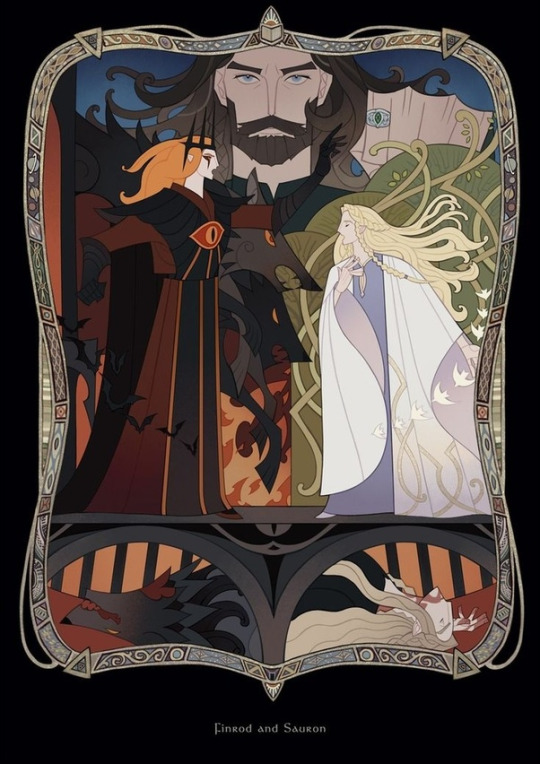
By Wavesheep
Unfortunately, it does not end the way it would if this were a Barbie movie or an anime. Finrod is a great singer, but Sauron is better — he is a Maia, one of the Ainur, meaning he was there when the original Music of creation was sung. It’s impressive that Finrod manages to hold out as long as he does, but in the end — much like Fingolfin and Fëanor before him — he loses.
To tell this part of the story, Tolkien randomly switches to verse; he quotes a section from the Lay of Leithian. Medieval texts actually do this; lots of them will randomly switch between prose and verse. Texts that do this are called “prosimetric.” For example, in the Volsung Saga (which reads very much like The Silmarillion), when Sigurd meets Brynhild, the text abruptly switches into verse as she lists all the different types of runes and their uses. There’s several other instances in that text when it randomly switches between prose and verse. It prefaces the verse parts with something like, “So saith the song of Sigurd,” referencing poetic versions of the same story that otherwise don’t survive. Tolkien evokes that same structure here, right down to saying “as it is told in the Lay of Leithian.”
The Lord of the Rings is prosimetric, too, but most of the songs are diegetic, meaning they’re actually being sung by characters in-universe. That’s not what’s going on here. The verse part describes the singing contest between Sauron and Finrod, it’s not the actual songs that they’re singing. But it’s really clever of Tolkien to switch to verse to describe this scene, because it sets the vibe! It’s like you’re listening to a distant echo of their songs, passed down through generations of oral storytelling. It wouldn’t be nearly as evocative if he just described the scene flatly in prose.
Thank you for indulging me in that tangent! Moving on: Sauron throws Finrod and co. into a dark pit, and threatens to kill them if they don’t tell them who they are and why they’re there. Periodically, he sends a werewolf to eat one of them (which, I’ll bet you anything, is a direct reference to the Volsung Saga). Still, none of them talk.
Meanwhile, back in Doriath, Lúthien intuitively senses that something is wrong, and asks her mother what has happened to Beren. Melian tells her that Beren is in Sauron’s dungeon. Lúthien resolves to go and rescue him by herself. She goes to ask Daeron for his help, but Daeron refuses to risk his own neck for Beren’s sake. He’s been afflicted with full-on incel syndrome, so out of spite, he snitches to Thingol a second time. (Thingol is so grateful that Daeron keeps tabs on his daughter for him, that he names Daeron a prince. Make of that what you will.) Thingol can’t imagine anything worse than letting his daughter waste away in a dark pit, so he builds a house in a giant beech tree, called Hírilorn. Because the best way to keep your daughter safe from one prison is to put her in another! Logic!
Well, it’s a common trope in myths and fairy tales: The king is overprotective of his daughter and puts her in a tower, or a box with a hole in the roof, or some such. Lúthien, however, is proactive. She doesn’t wait for someone to rescue her from her treehouse. Instead, she tricks her guards and Daeron into sending her a golden bowl of wine, a silver bowl of water, a spinning wheel, and a loom. Then she sings a spell that mentions all the tallest and longest things in the world, which causes her hair to grow extremely long. She mixes the wine with the water, then sings a song of day over the golden bowl, and a song of night over the silver bowl. Finally, she sings a song of sleep. The singing enchants her hair, filling it with corresponding ideas that shape the way Lúthien wants it to behave. (Similar to Sauron and Finrod’s magic songs, singing about an idea causes it to manifest.) She weaves a robe out of her hair, a robe that’s described as being misty and shadowy, like it’s woven from clouds at night. Lúthien weaves a rope out of what’s leftover, and puts a sleeping spell on it. Then she just throws it down onto the guards at the foot of the tree, and they go to sleep, allowing her to climb down the rope and escape.

Lúthien prepares her escape from Hírilorn by Anke Katrin Eißmann
As she leaves Doriath, she comes upon Celegorm and Curufin, of all people. They’re out hunting, hoping to learn something about what happened to Finrod (and probably plotting behind his back the whole time). Among their hunting dogs is a particularly large wolfhound called Huan, who actually came with them from Valinor. Oromë himself, the Vala of the hunt, gave the dog to Celegorm long ago. Huan loyally followed Celegorm into exile, and therefore became automatically subject to the Curse. He’s foretold to die, but only after he faces the biggest and baddest of big bad wolves.
Spoiler alert, the dog’s gonna die!
Huan finds Lúthien, because he’s immune to her enchantments, and brings her to Celegorm. Once she learns that Celegorm and Curufin are enemies of Morgoth, Lúthien decides that she trusts them, and reveals herself to them. Celegorm (or, in the Lay, Curufin) instantly falls in love with her, because… of course he does. He offers to help Lúthien, making a point not to say that he already knows about the quest. Lúthien goes with them to Nargothrond.
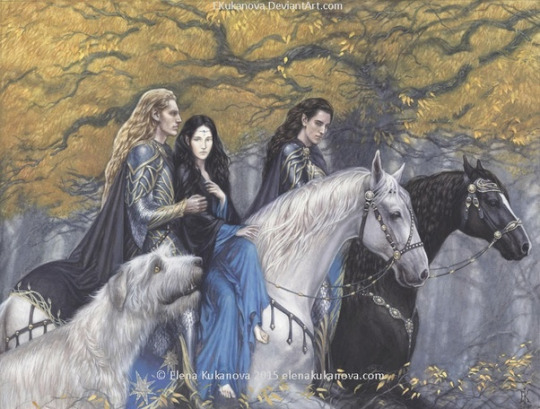
Celegorm and Curufin find Lúthien by Elena Kukanova
As soon as they get there, Celegorm and Curufin show their true colors. They imprison Lúthien, take away her magic cloak, and forbid her to speak to anyone else but them. Lúthien escaped one trap, and fell right into another. Now that the brothers know from Lúthien that Finrod and Beren are in Sauron’s prison, they figure that it’s easiest to just let them die. Nargothrond is as good as theirs. And now that they have Lúthien, they have leverage over Thingol — they can force him to give Lúthien’s hand in marriage to Celegorm. That would make Celegorm and Curufin the most powerful princes of the Noldor! [Insert evil laugh here.]
Huan, however, is the Goodest Boy and is too pure-hearted to follow Celegorm (even though Celegorm is his beloved master whom he’s been serving for literally centuries). Huan also fell in love with Lúthien upon seeing her for the first time, but in a decidedly less creepy way. He comes to her prison every night to keep her company, and Lúthien tells him all about Beren.
Huan decides to help Lúthien break out. He brings her magic cloak to her, and speaks to her (he’s only allowed to talk three times before he dies). He shows her a secret passage out of Nargothrond, and they escape together. Huan even swallows his pride enough to allow Lúthien to ride on his back.
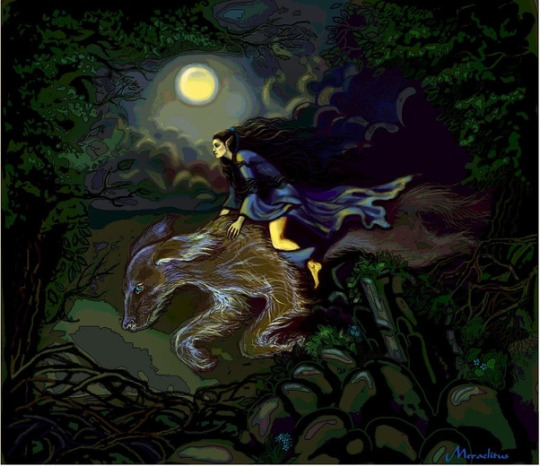
Lúthien riding on Huan by Meraclitus
I mean, if you’re gonna be a damsel in distress, a dog is a pretty awesome thing to be rescued by.
(Stopping there, because I'm running up against the max number of images. More to come!)
#the silmarillion#the silm#silmarillion#silm art#the silm art#the silm fandom#silm fandom#beren and luthien#fingolfin#morgoth#beren#luthein#luthien#finrod felagund#celegorm#curufin#thingol#melian#sauron#tolkien#jrr tolkien#j.r.r. tolkien#middle earth#long post
55 notes
·
View notes
Text
The Curse of the Uncursed (Thranduil x Feanorian Reader)
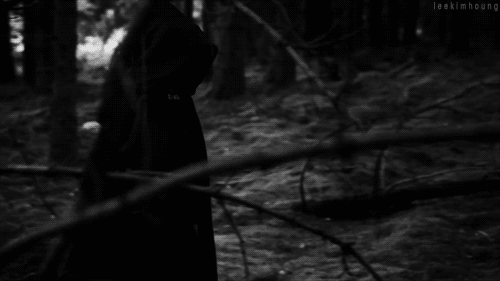
Part 1 | Part 2 | Part 3 | Epilogue |
Summary: What would your son look like? You did not get to see him when you gave birth to him. You did not get to see him before your death. Only remnants of his movements in your belly remain in your memory.
AN: thank you everyone for your kind words for the last part of this fic. I enjoyed reading every single one of them after long hours of work. That being said, sorry for the delay but here is the last part of this series. I may work on some headcanons about the plot in the future but nothing is set right now. I hope you enjoy this.

Legolas feels the lands of his birth leave him as he watches the shores of Aman greet him. His kingdom, his father, his people, and their memories are all left on the nether shores. All but his friend, Gimli, who stands beside him.
Maybe someday, in some peaceful age, he would welcome his father to these shores. A lungful of grief and a heartful of joy fill him as he finds his grandfather, King Oropher, on the shores.
He embraces his grandfather in the way of men, a way taught by Aragorn. And his grandfather, although taken aback, hugs him back with equal vigor. None of them mention Thranduil. They cannot bring themselves to.
Legolas' eyes wander, looking for someone else. Someone he has never seen, someone he does not remember yet knows. His mother. He looks for you, whose name he has not heard once from his father's lips.
Yet, he knows that you have loved him more than life. And now that he stands on the shores of the land that you live on, Legolas does not see you in the crowd of people welcoming him.
"Her kind is not welcomed on these shores," Oropher speaks, noticing Legolas' wandering eyes. "Not after what they did ages ago."
Hot, seething rage fills Legolas at the hostility he sees in his grandfather's eyes. Was this what his mother faced while bearing him? Such hatred that she had no part in. "Her son is a part of the reason that Arda remains peaceful and the Dark Lord Sauron stays defeated," for the first time, Legolas lets pride and steel of wrath seep into his voice.
"And if these shores cannot welcome my mother, who has been forgiven by the Valar, then I see no reason to be here any longer," with these words, Legolas finds his feet walking away from his grandfather, who does nothing to stop him.
He is aware of Gimli calling for him, but he continues walking as his Dwarven friend complains about emotionally constipated elves. Everything feels too unfair. Why did his mother face such hostility when she did nothing wrong? How sad must she have been with how everyone treated her? And he…he wasn't there for her.
Guilt builds in his heart, and the streets of Alqualonde blur as tears cloud his eyes. He wants to leave so badly. He wants his mother. He wants to comfort her and take away her pain. He wants to reassure her and make her smile.
Legolas bumps into a figure, and a warm voice greets him. "And here I thought I would welcome my grandnephew with smiles," a voice he does not remember. A golden-haired and silver-eyed elf smiles at Legolas.
Atandil, or "Friend of Men," King of Nargothrond, Finrod, beams at Legolas.

"Yonya, your pacing would help little. I recommend you sit and wait. That Findarto is pretty good with his words. He would definitely charm your son into coming here," Celegorm comments, perched on a chaise as he observes you pacing around the room.
His own anxiety is well-hidden behind his cocky exterior. You turn to look at your father, "Do not talk like that about Uncle," you warm him. It had taken decades of your work to mend the broken ties between the Finweans. Your father and Uncle Finrod had been one of the toughest ones to work with.
Your heart races as you imagine your son somewhere on the shores of Aman. So close, yet so far. Only your respect for the Teleri holds you back from rushing to the shores that would bear your son's ship.
Your son, who played a big part in the destruction of the rings once forged by your cousin, Celebrimbor. "I will definitely brag about my grandson to that Curufin. Let him know the actual hero of Arda," you shake your head at your father's obnoxious words. You would have to make sure that he truly does not offend your uncle or Celebrimbor, who seems to be recovering well.
What would your son look like? You did not get to see him when you gave birth to him. You did not get to see him before your death. Only remnants of his movements in your belly remain in your memory.
As Celegorm's words linger in the air, your pacing slows, and you reluctantly settle into a nearby chair. The room is filled with a mix of anticipation and unease, and your mind drifts to the memories of your son, Legolas, whom you have never met in person. It has always been a painful void in your heart, knowing that you couldn't be there for him in his formative years.
Your thoughts turn to the events that shaped his life—the battles fought, the sacrifices made, and the role he played in the destruction of the rings. Pride swells within you, mingled with a bittersweet ache. Legolas, your son, is a beacon of hope in a world plagued by darkness. The knowledge of his accomplishments fills you with immense joy, but it also deepens the yearning to be with him, to hold him in your arms.
You gaze at your father, whose tongue always seems to wander freely, his remarks occasionally straying into offensive territory. The mending of broken ties within the family has required delicate care, and you have worked tirelessly to foster understanding and forgiveness. The last thing you want is for your father's words to undo the progress made.
"Ata, please," you implore gently, your voice tinged with a mixture of weariness and determination.
Your father sighs, his expression softening, "I will welcome my grandson and offer all that we have, but never, in this eternity, will I ever welcome his father," steel of hatred fills your father's jovial voice as he talks about your husband, Thranduil. "He who made you suffer, made you cry, made you pay for wrongs you had no part in, has no place in my heart," your heart shudders as you observe the wrath in your father's eyes.
"He held no mercy for you, not even when you bore his child, not even the decency to let you meet your son," Celegorm gets up from his seat, and his eyes brim with tears as he cups your face in his hands. "He made you suffer for my crimes. He made my daughter go through the worst of fates ever. I cannot forgive that. Not even in this blessed land."
Thranduil remains one subject that your father never switches his views on. Of all the repentance and grief, your husband is a thorn in your father's heart.
You do not speak anything on the topic of your husband. You cannot bring yourself to. Guilt, remorse, and regret make it hard to do so.

As Legolas steps through the magnificent halls of Tirion, his heart beats louder than ever. He cannot bring himself to be awed by the glamour of the city or its palace. All he can do is steel his mind to keep up with his granduncle Finrod's steps.
Yearning greater than the depth of the ocean, the endurance of a mountain, or the vastness of the entire sky seems to fill his every pore.
Anticipation, fear, and joy all crowd his heart. The mother who loved him greater than life,
would she love him still? Would she be pleased to see him as he would be to her? Would she let him be a part of her grief and allow him to share his?
With all these questions plaguing his mind, Legolas finds himself rooted in the spot as he watches Finrod push open the doors that separate his mother and him. Mere wooden doors that seem to be most potent at that moment.
A curtain of long silvery hair and sparkling green eyes, like the beginnings of the spring that Mirkwood was once known for, greets Legolas. You… his mother…
He does not hear the background voices of Finrod or others. Nothing matters in that moment. Legolas feels whole for the first time in his life.
He watches as you rush towards him, your steps hurried, and when in the haste of your movement your feet falter, Legolas finds himself supporting you, catching your arms and holding you.
"Yondo," after a separation so long, Legolas cannot will himself to stop his tears at the first mention of an address from his mother. He does not stop you when, with trembling hands, you cup his face and kiss the top of his head.
Maybe not all the wrongs in the world can be undone, maybe Arda truly can never be unmarred, but it remains beautiful nevertheless. And Legolas believes it to be true at this moment.

Feanor's heart weeps. He has yearned, raged, and lamented for many, but never has a sorrow been so potent as the hurt of his grandchildren.
Since he first caught a glimpse of Celegorm's child from the solitary halls of Mandos, he cannot help but feel endeared towards you, who resemble his mother so much.
Maybe, in those long years, it was your well-being that kept Feanor looking out for the nis growing up in the lands of the Sindar.
Your grief, your joy, your love, all feel too personal to Feanor. Closer than the Silmaril or the pains of his own children. But that means that Feanor witnessed your fall. With an irony stronger than ever, your fate is similar to Miriel's.
Feanor's soul burns with the hatred of a thousand suns for the Sinda who abandoned his granddaughter, who left you alone and cold, yearning for your son. In those moments of despair, even the confines of Mandos's halls tremble at his rage.
This restlessness only grows until he meets you. You, who, even in the grief of your own death, came to console him. In those moments, Feanor's soul cannot help but mellow down at your gentle urging.
So, Feanor spends ages in the desolate halls of Mandos, looking over his family that resides in the blessed realm. And his great-grandson, who fights against the Lieutenant of Morgoth.

The lands of once Greenwood the Great now lie overrun by wild vines and overpowering fauna. A forest that was once a kingdom now speaks only of ruins. The elves who once resided there have long left for the shores of Aman.
Only one remains. A fallen king who wears no crown. A king who does not sit on a throne. Instead, he spends ages trapped in a room. No lock, no shackles bind him, but he remains seated by a window.
A window that witnesses changing seasons and the paths of the sun and moon.
The one called Thranduil awaits his redemption or any form of forgiveness. He does so now that he remains free of his role as the king to his people or a father to his son. For now, he remains Thranduil, who once wedded you and Thranduil who once loved you more than his soul.
In those moments of solitude, Thranduil allows himself to read every single one of your letters from long ago. Long ago, when you waited for him in the same room. He grieves as he reads. He allows himself to mourn for the loss of his love, you, your marriage, and his very self.
Maybe the age of elves is over, but Thranduil's repentance stretches long into the eternity of Arda.
#tolkien elves#thranduil x reader#thranduil#thranduil x wife#the silmarillion#celegorm#legolas#Legolas' mother#feanorian reader#angst#angst with a hopeful ending
386 notes
·
View notes
Text
(Continued from this post)
After breakfast, Earwen cleared the plates away. Finrod had attacked his food like one who was starving - and Finarfin supposed he had been, long ago and far away, when he had fallen in the dark - and had seemed a little in shock afterwards. Perhaps it was the absence of the desperation he had felt in his last weeks - Finarfin shuddered again at the borrowed memory - or the ease with which what he wanted could be obtained. Or perhaps he was merely still unused to eating, after so many years without a body. Finarfin had heard that it could be so.
Still, his son leapt to his feet and offered to help. “Please,” he said, “I have done nothing to help you, all yesterday and today.”
Earwen shook her head and clapped him companionably on the shoulder. “You have been back for so little time that I keep stumbling over the sight of you. I insist you let yourself rest, and do nothing for at least one six-day.”
When Finrod still looked doubtful, she had looked over at Finarfin and laughed. “Besides, your father would never speak to me again if I assigned you such a menial duty, when he is looking at you like you hung the Valacirca and set Tilion’s course yourself.”
Finrod met Finarfin’s gaze, startled, and Finarfin blinked back. He realized belatedly that he had indeed been staring at Finrod for far too long. It was just that he was so familiar! So familiar, and so dear! How - how - how had he gone an Age without seeing his children? He did not know. The grief for his other dear ones warred in his heart with the rising crest of joy that would not be denied: his eldest was home! Home, and safe, and himself. It was nearly unbelievable.
Finrod looked as if he were about to say something; but after a moment he dropped his gaze. His eyes so often fell away from Finarfin’s face, as if afraid of a blow, or a rejection. As if there could be one, as if Finarfin would be capable - !
He wanted to explain, to take Finrod by the shoulders and tell him of all the messages he had choked down within himself for years uncounted: for him, for all their children. In the early days he had wandered about the rooms of their old family home like one whose fëa had departed, thinking, my children, my children, I am sorry if I ever said you were too loud; come back, for this house sounds like my father who is dead.
He had sat upon Ingoldo’s bed and thought, my eldest, my son, what will I do without your laugh; had wandered in upon a half-finished painting of Artaresto’s and felt all the colors run together in his mind; tripped blindly over Angaráto’s hunting bow and Aikanáro’s bangle of necklaces, tangled together in the hallway; come upon a little mirror that Artanis had crafted at but twenty years of age and stared into it for an afternoon as if her face would suddenly swim into being, laughing: see, Atar, I have hidden from you again! You are not very good at finding me.
And then the many years after, holding messages for his children that would never - as he thought - be delivered. For Findaráto, it had most often been stories of the court: little exasperations, or funny moments that he thought his eldest would like. For so long, he had turned automatically to Findaráto with little observations or the beginnings of ideas, for his son had a gift for spinning out his tangled thoughts into a beautiful weft and then handing it back to him all shimmering. It had taken him so long, nearly a hundred years into his long exile - for it was an exile, sealed away from his family as much as they were trapped away from him - to break himself of the habit.
But now Finrod was here.
Finarfin shook himself; mustered all the gentleness that was left inside him after forty years of war; smoothed away the lingering frustration and grief that Finrod could not trust him; and said, “Shall we find you a comb?”
Finrod laughed suddenly, and Finarfin nearly jumped. That sound - he had not heard it in so long! The clearness of it!
Finrod laughed again, and said, “I suppose my hair must be a sight. Yes, let us - and help would be most welcome, if you are still willing.”
“Of course,” said Finarfin, and led Finrod up the stairs. He made his way to the chambers he shared with Eärwen and rummaged about for a little before finding what he sought. Then he bustled out again, meeting Finrod, who again was hovering uncertainly in the doorway.
“Let us go to your room,” said Finarfin, brandishing his prize. “There is a new style of brush which is all the fashion in Tirion now. Rather than being sung or carved into shape from wood, it is made of goats’ hair. One rubs a little oil into the bristles before brushing. I have found that it does wonders for how my hair lays, and it makes the braiding much less painful later.”
Finrod’s eyes lit up. “I have seen this before!” he exclaimed. “Well - not this exact comb - but the Dwarves used a very similar implement to care for their beards. I believe it was made of boar-bristles. I wonder that we never thought to use it on our own hair!” His smile turned wistful. “But then, perhaps it is not so surprising. Relations could be - difficult, and there was much else to think about.”
Finarfin thought of the Great War, ended not four hundred years past. He remembered how the dirt and the blood and the filth had worked their way into every crevice he possessed, caking his hair and face - how he had wanted to cut it short, and only kept it long thanks to the advice of his Sindar advisors. He remembered the tiring dull periods between battles, and how there were always warring factions to be kept in check, commanders to be pacified, supply lines to organize, little squabbles to calm, and of course his appearance desired everywhere, for all wanted to know that the king was there, and that he had heard their grievances, and was confident the war was not going ill…
“Not surprising at all,” he agreed at last, softly. “War is - terrible, and tedious, and all-consuming. And you were fighting for a very long time.”
The smile dropped from Finrod’s face. “How easy it is to forget,” he murmured, “that you too went to battle. My gentle father! I am sorry. All our effort, all that pain, and in the end it was - useless.” He looked up at Finarfin, eyes pleading. “I really believed it, you know,” he said. “I believed it, when we set out on the road. That we stood a chance. That we could defeat the Moringotto, or at least hold him back from our home. That I could build a safe place for our people. Yet all was in vain, and you were wiser than I.”
Finarfin stood in the hallway, brush in hand, and felt the words strike to the heart of him. How he had longed to hear that, from anyone! For years uncounted as he had labored alone to build anew the trust between Noldor and Teleri, as Eärwen had looked coldly at him and then turned her face away, as his father was silent in Mandos and his mother retreated from him in grief. He had longed, in anger and then in despair, for someone - anyone - to come back, and say, You were right. I was wrong. I am sorry.
But now it rang hollow. Finarfin did not want that. Not if it came from his son, standing before him tired and in disarray. Not if it was paired with yet all was in vain. Not if it came at the price of Finrod’s tired eyes and hollow cheeks.
And besides -
Finarfin brushed past I am sorry with barely a thought, and said, “You shall not stand before me and name your efforts useless.”
This was another thing he had wanted to say to Finrod, and there was nothing now preventing him.
“Do you know,” he said, “have you thought - how terrible was the onslaught of the Valar in Beleriand! How bright the armor of the Maiar, how shining the eyes of my mother’s people! Círdan trusted us, for Ulmo’s sake; but even Gil-Galad was wary. How much more so the Noldor who were Doomed, the Sindar who refused the call West - to say nothing of Dwarves and Men! We very nearly found ourselves arrayed against an alliance of mortals and Avari before we could strike a single blow against Morgoth. And I do not blame them! How could they trust us, who were so tall and so strange, and came dressed for war?”
He paused to breathe, chest tight. Finrod was staring at him transfixed.
“And then,” Finarfin continued. “They saw me. Or rather - they saw you. They saw you in my face. And at once they laid down their arms.”
He stopped again. The moment was graven in fire on his heart: stepping out bareheaded and pleading in front of a crowd of shaking and dirty Beleriandrim, hoping they would just listen. The utter silence that had fallen. The clatter of falling weapons his son’s epitaph.
“Everywhere I went, I heard the whispers. Felagund. Atandil, Edennil, Friend-of-Men. Angolodh. You came before me and smoothed the way, as a father should do for his son - not a son for his father! There was not a place I could go where I was not gathered close to the hearts of the people. From everyone, I heard of you; by everyone, I was asked about you. Do you know - did you know - how you were loved?”
“Yes,” said Finrod. His breathing was ragged, and grief had settled upon his shoulders like the heavy mantle of his House: proudly worn yet wearying. “Yes. It was the greatest gift I have ever been given.”
“Then - then do not say useless!” said Finarfin. “For it was not. You were not forgotten. The Dwarves of Nogrod allied with us for love of Felagund; the Men of Brethil, for love of Nóm; the Sindar for Finrod the Beloved. I was - I am - so proud. My son! My son, who has surpassed his father!”
Finrod was looking at him with wet eyes. He did not move.
“I did not expect this!” he said at last. “I expected - I do not know. Fury, perhaps. We parted in such anger; and if, as you say, our efforts were not vain, they yet led to pain and death.” His eyes were distant. “My little brothers! Yet you are kind.”
Finarfin, still clutching the comb, crossed the distance between them and gathered the other in his arms. Finrod’s chest rose and fell against his own; his golden head was laid upon Finarfin’s shoulder.
“If you think,” Finarfin said, “that I could ever love you any less, or welcome you with any feeling other than joy, then I think that you have not been paying attention.”
Finrod was still; and after a moment Finarfin stroked his son’s bright head, and said gently, “Come, hinya - let me at least take care of your hair.”
#finrod#finarfin#once again just detailing every fucking minute of finrods return cuz i have incurable brainworms#silm fic#my writing#earwen
220 notes
·
View notes
Text
I kinda feel like with how much Elrond gets depicted as the heir to Doriath or Gondolin or the House of Fëanor, or all or none of the above, we sometimes forget about his human half.
(or human 3/8ths, whatever)
On Balar, did he ever wander among the escapees from Dor-lómin, the fled from Brethil, the survivors from Sirion, learning their songs and stories and hopes and griefs? Did he find his childhood playmates, now grown? Did any survive? Does he remember them?
Did he ever stand beside his brother as Elros gave mighty speeches of unity and the strength of the Secondborn? Did he, in battle or in uneasy alliance, meet the descendants of those who betrayed Maglor and his kin, who enslaved Tuor and his kin?
Did he ever brave the moonless dark of Taur-nu-Fuin, seeking the ruins of Ladros or the mire that was once Tarn Aeluin? Did he ever wander the scorched plains and shattered encampments of Estolad? Did he see the Hill of Slain and guess which skeleton may have been more recent than the rest? Was another skeleton holding its hand, an arrowhead in its skull?
Did he grudge Elros the Bow of Bregor or Dramborleg or the Ring of Barahir? Did he think to keep relics for himself, if immortal memory could not suffice? Did he know the Bow's name?
In Lindon, did he befriend the Men who refused Númenor? Did he live alongside them for centuries as they lived and died? Did he seek out Dor Firn-i-Guinar, if it may have survived?
Did he find it?
Did he send letters to the West through Númenor, seeking the truth of Tuor's fate? Did he ask after the ancient legends and myths of the House of Bëor, now only remembered by Finrod Atandil? Did he befriend the ancestors of the Dunlendings, distant kin of the House of Haleth? Did he speak against the deforestation of Enedwaith and Minhiriath, their homeland? Did he welcome those who fled into Imladris, if they sought it?
Did he visit Númenor? Did its kings listen to his counsel? When did they stop?
Did he welcome Elendil as a kinsman, as a nephew, or as a stranger?
(I could go on into the Third Age but I think this is getting long enough already.)
94 notes
·
View notes
Text
When King Felagund arrives to Doriath, his face is grey with grief.
His figure is thin. Worn. Shuddered by occasional tremors, either from the wind and snow that do not cease, or from many scars his body wears. His rich, golden hair is now bland, thin, cut short and uneven; his face is tired and hollow as he steps, slowly, towards the enterance to the palace of Menegroth.
The guards dare not stop him. He spares them no glance.
Menegroth is quiet. Menegroth is a grave, with king Thingol sitting on his throne, hunched in grief, and queen Melian as cold as a marble statue. King Felagund does not stop once while making his way towards the hall where they grieve.
King Felagund has little sympathy for grieving people left. His own grief ate his heart out and settled in his gut. He makes his way to the throne room. His face gains purpose; he is a dead man dragging himself to his last mission.
There is a crowd behind him when he enters the cave. He stops before the throne. His chest rises and falls slowly, and his eyes burn with fell flame.
Thingol jerks, rises his head. His eyes focus on Felagund. He gasps.
"Finrod," he chokes, and almost rises from his throne.
Felagund does not move. His eyes are fixed on Thingol.
"Tell me, was it worth it?" he finally asks.
His voice is quiet. Dark. Menacing. Thingol wavers, his face changing into a fleeting confusion.
Felagund's hand is under his cloak. He takes it out.
Slowly.
It is clutched in a fist.
The crowd holds its breath. Felagund does not take his eyes off Thingol.
"Tell me," he repeats, louder, and his voice trembles. "Was it worth it?!"
His eyes are stained with tears. He trembles.
He cries.
"When I sent you my messages," he whispers, shaking, the sound echoing from the walls, "tell me: did you ever, in your stubborness, in your pride, in your selfishness - did you ever try to see the voice of reason within them? When you looked at your daughter, tell me: did you ever think of yourself, young and reckless, standing enchanted beneath the trees? When you looked at Beren, tell me: did you not see the hand that guarded you, a soul so worn and scarred and lonely?"
Thingol is shaking. Felagund lifts his head. His face is stained with tears. He rises his voice.
"Tell me!" his words echo from the walls, drum with grief, loss, power. "Tell me! When you named your price, have you ever - ever - regretted it? Have you ever wished to utter words of blessing instead, even if they were stained with sorrow? Have you ever," he screams in earnest now, and his hand trembles as he lifts it high, "looked back and thought the price was too high? Have you ever thought that you failed to pay it?"
Thingol sits pale. The halls shake with Felagund's cries.
"I had to watch them," he sobs, "I had to watch them die in darkness. I had to listen to my friend, the man I swore to protect, the last descendant of a man long gone - I had to listen as he was devoured, I had to trash and cry - and I did not even get a body!" he screams, tears springing from his eyes. "I had to look at your daughter, as she shook and wept, and I could not comfort her, because he was gone! Because he was gone, and she loved him, but he was gone! Tell me, when you dismissed my letters so angrily - tell me, have I not warned you against this exactly?! Your daughter, your Lúthien, your starlight - gone, gone as a withering ash under the touch of wind! In your desire to save her, have you ever thought you were signing her death sentence?! Tell me, Elu Thingol: was the price really worth it?!"
No, Thingol screams, no - but Felagund's hand is shaking, and the light coming from within it is all but blinding, and Finrod yells as he throws the Silmaril on the ground, and the walls shake with his grief.
"Here is thy prize, Elwë Singollo!" he screams, glowing and shaking and terrifying, speaking the tongue Elu long thought forgotten. "Here is thy prize, here is thy reward! Here is Tinúviel, weeping on her knees, for her lover is torn to shreds, his remains breathless in her hands! Here is Beren, young and weary, whose voice knew nothing but tenderness when he talked about his Nightingale! Here are my Faithful, dead for thy foolish whim, torn apart for the greed of a madman who thought himself a God! Here," he trembles, "am I, for I am dead, dead, dead, and dead I should have been, and dead will I become! Here is your prize, Elu Thingol! Die by it!"
And with those words, he flees, nothing but the light of now double-accursed stone remaining.
When someone picks it up and hands it to Thingol, the palace is pierced by a wail of horror and agony. The gem burns the Greycloak's hands.
#finrod#thingol#luthien#beren#silmarillion#silm fic#lay of leithian#2:22 SOMEONE STOP ME#YELLING#SO NORMAL ABOUT THIS
312 notes
·
View notes
Text
In Due Time
Celebrían/Elrond | G | ~800 words | @nolofinweanweek | AO3
Celebrían, pale in the light of the silver lanterns that hung about their bedchamber, sat silent before Elrond as he treated her wounds. Ever since she had been brought back to Imladris, she had seemed to him ghostly and ephemeral, as if at any moment she might disappear from beneath his hands.
As he smoothed a salve over her lingering wounds, Celebrían made no response, neither crying out in pain nor flinching from his touch. Few of her wounds now remained; most of the wounds that had scored her body had faded to red, puckered scars that ran down her back and limbs like knotted ropes. Those he rubbed a different salve on, one to fade their color and lessen their knotted appearance. His movements as he worked were slow and gentle, soothing.
Celebrían had said little of what had happened to her in the dark dens of the Orcs, but the wounds upon her body and the instruments of torture that Elladan and Elrohir had found when they had hunted down the last remaining Orcs and driven them back to their dens had told the story of her suffering well enough. Her silence had said the rest.
Would that it had been him instead of her who had suffered at the cruel hands of the Orcs.
Elrond brushed Celebrían’s hair, limp and lank, away from her shoulders, tracing the lighter scars that netted her shoulders. These he did not treat; they would fade in time, for the wounds had been shallow.
Time. Every day he felt as if he had less of it, as if their days together were drawing to an end, as surely as winter nipped and howled at the heels of autumn. She would not stay here. Every day he grew more certain of that.
He brushed his thumb over a light scar, then bent and softly kissed her shoulder. Celebrían made no response.
Closing his eyes, Elrond pressed his forehead against the crook of her neck and wrapped his arms around her waist, wishing that if he held her tight enough, she might stay.
If only he could mend hearts and spirits as well as he could mend skin and bone. If only he could reach her and draw her back from the dark places she now walked in her mind.
If only his love were enough.
A tear fell upon his arms, then another, and then another. Elrond wrapped Celebrían tighter in his embrace.
He held her long into the night.
— — —
They were alone at last.
It was now the late watches of the night, for Elrond’s arrival upon the shores of Tol Eressëa had heralded a flurry of long-anticipated reunions and first meetings that had lasted well into the night. So, too, had Galadriel, Mithrandir, and the Ringbearers been greeted with exultation. Avalloné had not seen such gladness and merriment for many long years of the sun, or so Celebrían had told Elrond. He thought perhaps she was exaggerating for his benefit.
Tilion now rode high in the sky, and his silver light fell upon their bed as Celebrían sat before Elrond, her hair pulled over her shoulder as he undid the laces of her gown. His fingers were clumsier at the task than they had once been, having forgotten the motions in their long years apart, but Celebrían sat patiently before him nonetheless.
Elrond slid the gown from her shoulders. The faint scars upon her back gleamed silver in the pale light of their room. He brushed his fingertips over her skin, marvelling. No longer was her skin knotted into red ropes. In their places were faint silver lines, smooth to the touch.
“They are no more,” she said, and Elrond heard the smile in her voice. “I asked Finrod for a salve,” she continued. “He told me that he had lessened his own scars with the use of one, and I thought that I might use it upon mine. It was not as effective as the one you made for me, but it worked well, and the power of this land aided it.”
Elrond smiled softly at her praise. “You have met Finrod?”
“He is even kinder than the old tales said.”
Elrond bent to kiss her shoulder. “You must introduce me,” he murmured.
Celebrían reached up and twisted her hand in his hair, holding him against her. “In due time,” she said.
He hummed against her skin and pressed a kiss to her neck, lingering. “Yes, in due time.”
Celebrían turned her head, smiling, and met his lips with hers.
#nolofinweanweek2023#nolofinweanweek#the silmarillion#lotr#elrond#celebrian#fotfics#my fic#i wouldn't be me if i weren't late to a fandom event
92 notes
·
View notes
Text

False Sight for Tolkien Reverse Summer Bang 2024 ( @tolkienrsb ) in collaboration with @halethleia.
Now King Finrod Felagund had no wife, and Galadriel asked him why this should be; but foresight came upon Felagund as she spoke, and he said: 'An oath I too shall swear, and must be free to fulfil it, and go into darkness. Nor shall anything of my realm endure that a son should inherit. - The Silmarillion, "Of the Noldor in Beleriand"
In the pits of Sauron Beren and Felagund lay, and all their companions were now dead [...] But when the wolf came for Beren, Felagund put forth all his power, and burst his bonds; and he wrestled with the werewolf, and slew it with his hands and teeth; yet he himself was wounded to the death. - The Silmarillion, "Of Beren and Luthien"
141 notes
·
View notes